Shows

Unsung HistoryIsabel KellyIsabel Truesdell Kelly earned her PhD in Anthropology from the University of California, Berkeley, in 1932, with a dissertation on the “Fundamentals of Great Basin Culture,” having researched the Northern Paiute and Coast Miwok Indigenous cultures of Northern California. After graduating she led excavations in Mexico and then began a career as an anthropologist with the US State Department, which had a growing interest in assisting the scientific and technological development of countries like Mexico as a way of maintaining a toehold in the region during the growing cold war with the Soviet Union. Joining me this week is Dr. Step...
2024-11-1141 min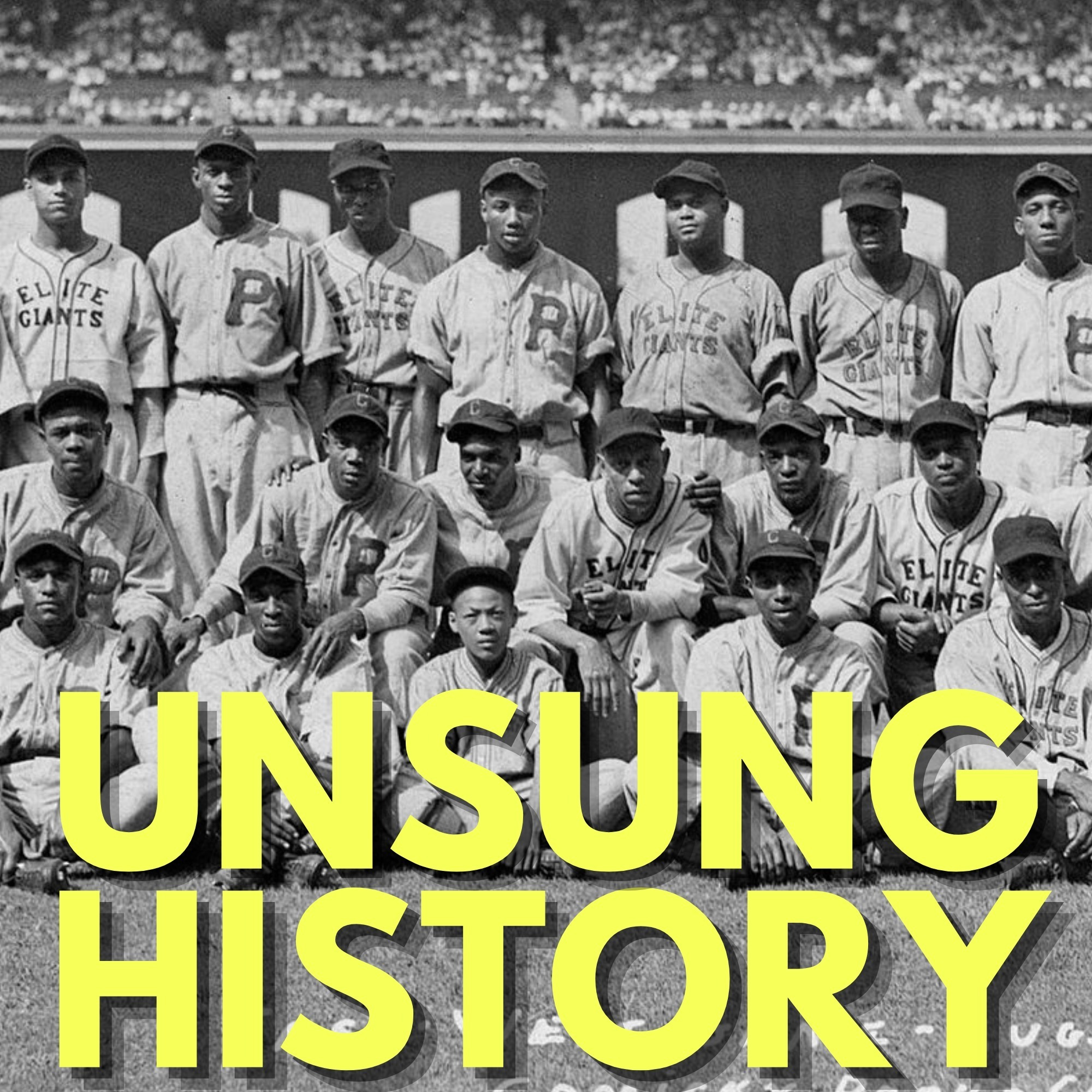
Unsung HistoryNegro League BaseballIn its earliest years, the National League was not segregated, and a few teams included Black ballplayers, but in 1887 major and minor league owners adopted a so-called “gentlemen’s agreement” that no new contracts would be given to Black players. In 1920, pitcher and manager Rube Foster founded the first of the Negro Leagues, the Negro National League, to organize professional Black baseball, which was played at a very high level. Other professional Negro leagues followed, and for decades the stars of the game played in the Negro Leagues, until the National League and American League began to slowly accept Black...
2024-04-2946 min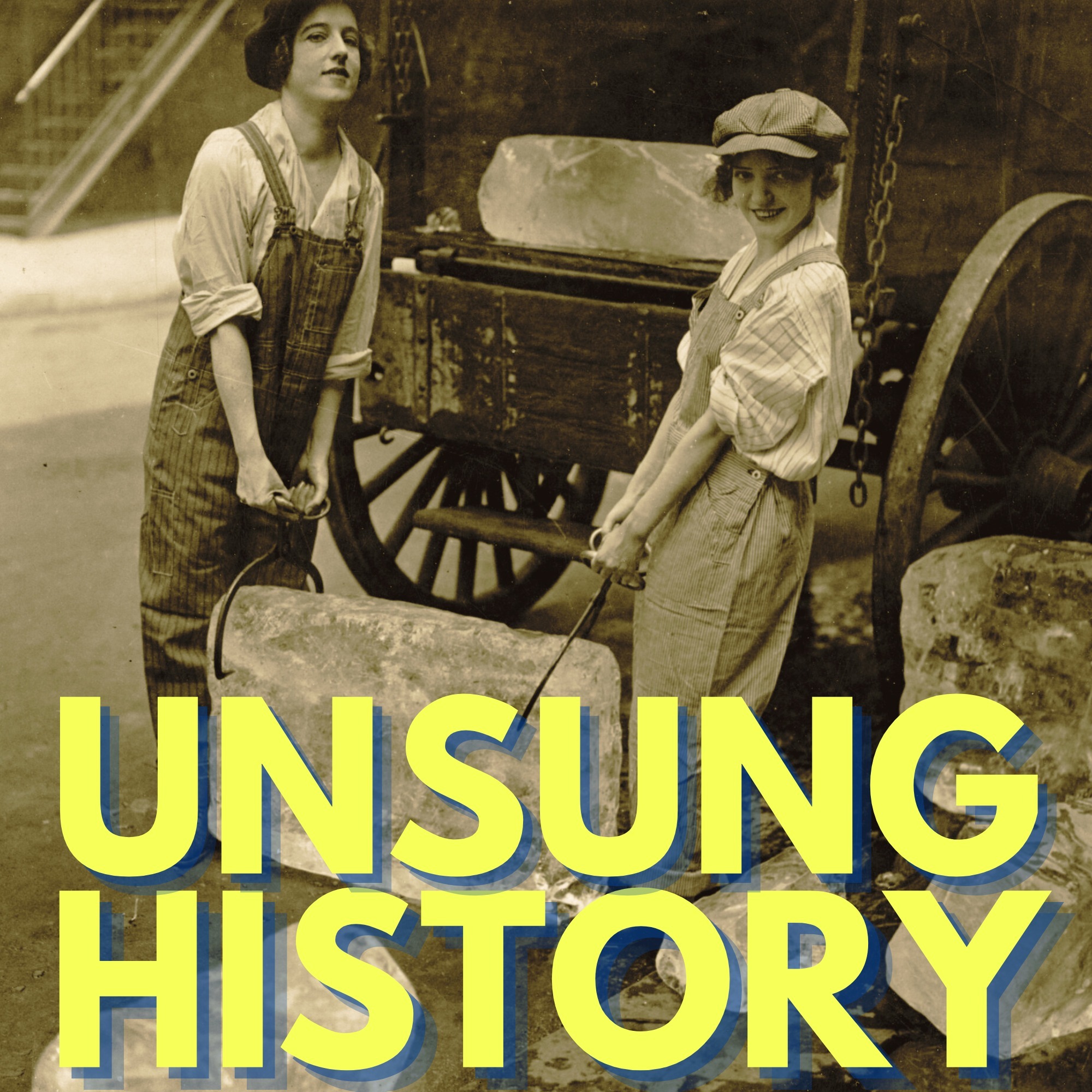
Unsung HistoryThe History of Ice in the United StatesToday, Americans consume 400 pounds of ice a year, each. That would have been unfathomable to people in the 18th century, but a number of innovators and ice barons in the 19th and 20th centuries changed the way we think about the slippery substance. Joining me in this episode is writer Dr. Amy Brady, author of Ice: From Mixed Drinks to Skating Rinks–A Cool History of a Hot Commodity.Our theme song is Frogs Legs Rag, composed by James Scott and performed by Kevin MacLeod, licensed under Creative Commons. The mid-episode music is “All She...
2024-02-1943 min
Green Living with TeeKelly Durbin: How to Support Sustainable Infant FeedingThis week Tee is delighted to welcome Kelly Durbin to the show for an enlightening and unique conversation about sustainable infant feeding and the power of human milk. Kelly is an International Board-Certified Lactation Consultant (IBCLC), childbirth educator, author, and volunteer breastfeeding counselor. She has co-authored original research on breastfeeding topics, including access to lactation care, community breastfeeding support, tele-lactation, and community vulnerability, published in numerous top-tier peer-reviewed academic journals. Kelly's book, Protecting Your Potential for Breastfeeding, published by Praeclarus Press, became available in June 2023. As a lactation consultant, Kelly has provided one-on-one consultations, taught numerous breastfeeding cl...
2024-01-0835 min
Unsung HistoryPullman Porters & the History of the Black Working ClassIn the early 20th century, career options for Black workers were limited, and the jobs often came with low pay and poor conditions. Ironically, because they were concentrated in certain jobs, Black workers sometimes monopolized those jobs and had collective power to demand better conditions and higher pay. The Pullman Company, founded in 1862, hired only Black men to serve as porters on Pullman cars, since George M. Pullman thought that formerly enslaved men would know how to be good, invisible servants and that they would work for low wages. In 1925, the Pullman Porters formed their own union, Brotherhood of S...
2023-07-3142 min
The Hit List PodcastTITANIC (1997) with Kelly Therese PollockIn this episode of The Hit List Podcast, I am joined by Kelly Therese Pollock, producer and host of the Unsung History podcast, to discuss one of the most iconic films of all time - Titanic.
Join us as we delve into the epic love story and examine the incredible dedication that went into creating this masterpiece directed by James Cameron. In addition to our usual film discussion, we also hear Kelly's thoughts as a first-time viewer, providing a fresh perspective on the film's enduring appeal.
Don't miss out on this insightful and entertaining conversation about one...
2023-04-171h 13
Unsung HistoryThe Green BookIn 1936, Victor Hugo Green published the first edition of what he called The Negro Motorist Green Book, a 16-page listing of businesses in the New York metropolitan area that would welcome African American customers. By its final printing in 1966, the Green Book had gone international, with a 100-page book that included not just friendly businesses throughout the United States but also hotels and resorts that would be safe for African American travelers in Canada, the Caribbean, Latin America, Europe, and Africa, along with a list of currency exchange rates. Joining me this week to h...
2023-01-3042 min
Unsung HistoryAmerican Women Writers in Italy in the 19th CenturyThe second half of the nineteenth century was a momentous time in Italian history, marked by the unification of the peninsula and the formation of the Kingdom of Italy. Three American women writers had a front-seat view of this history while they lived in Italy: Caroline Crane Marsh, the wife of the United States Minister; journalist Anne Hampton Brewster; and Emily Bliss Gould, founder of a vocational school for Italian children.Joining me to help us learn more about these American women in Italy in the late 19th Century is Dr. Etta Madden, the C...
2023-01-2342 min
Unsung HistoryThe 1968 Student Uprising at Tuskegee InstituteDays after the assassination of Martin Luther King, Jr., and after months of increasing tension on campus, the students at Tuskegee Institute in Alabama occupied a building on campus where the Trustees were meeting, demanding a number of reforms, including a role for students in college governance, the end of mandatory ROTC participation, athletic scholarships, African American studies curriculum, and a higher quality of instruction in engineering courses. Joining me to tell the story of the Tuskegee student uprising is Dr. Brian Jones, Director of New York Public Library’s Center for Educators and Sch...
2023-01-1646 min
Unsung HistoryShirley ChisholmThroughout her life, Shirley Chisholm fought for coalitional change. She was the first Black woman elected to the United States Congress in 1968, the first Black woman to run for President of the United States in 1972, co-founder of both the Congressional Black Caucus and the National Women’s Political Caucus, both in 1971, and co-founder of the National Congress of Black Women in 1984. Toward the end of her life, Chisholm told an interviewer: “I want history to remember me … as a Black woman who lived in the 20th century and who dared to be herself. I want to be remembered as a cata...
2023-01-0949 min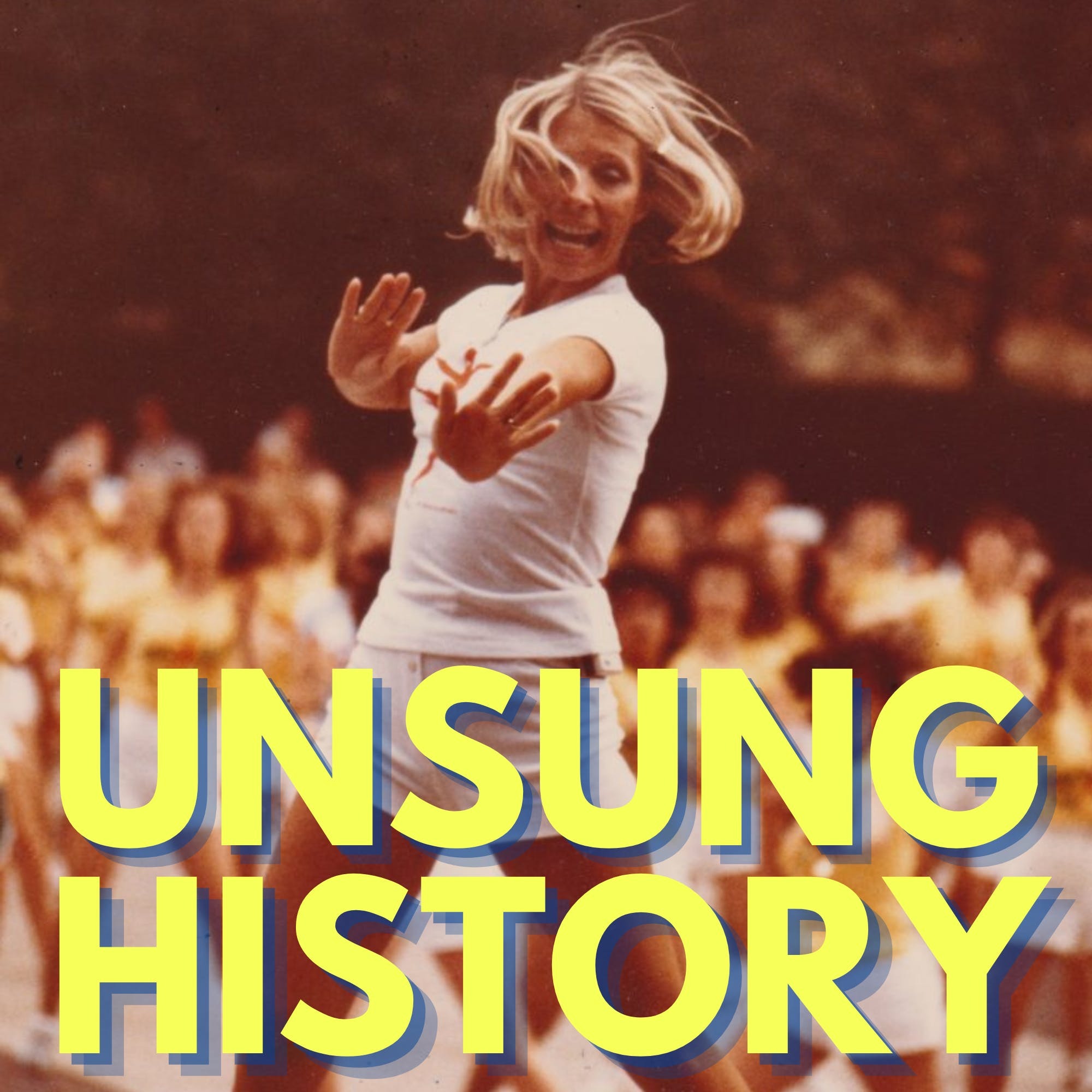
Unsung HistoryThe Aerobics Craze of the 1980sIn the late 1960s, Air Force surgeon Dr. Kenneth Cooper was evaluating military fitness plans when he realized that aerobic activities, what we now call cardio, like running and cycling, was the key to overall physical health. His 1968 book Aerobics launched the aerobics revolution that followed, as he inspired women like Jacki Sorensen and Judi Sheppard Missett to combine dance with exercise, creating Dance Aerobics and Jazzercise in the process. I’m joined on this episode by Dr. Natalia Mehlman Petrzela, Associate Professor History at The New School and author of Fit Nation: The Gains an...
2023-01-0243 min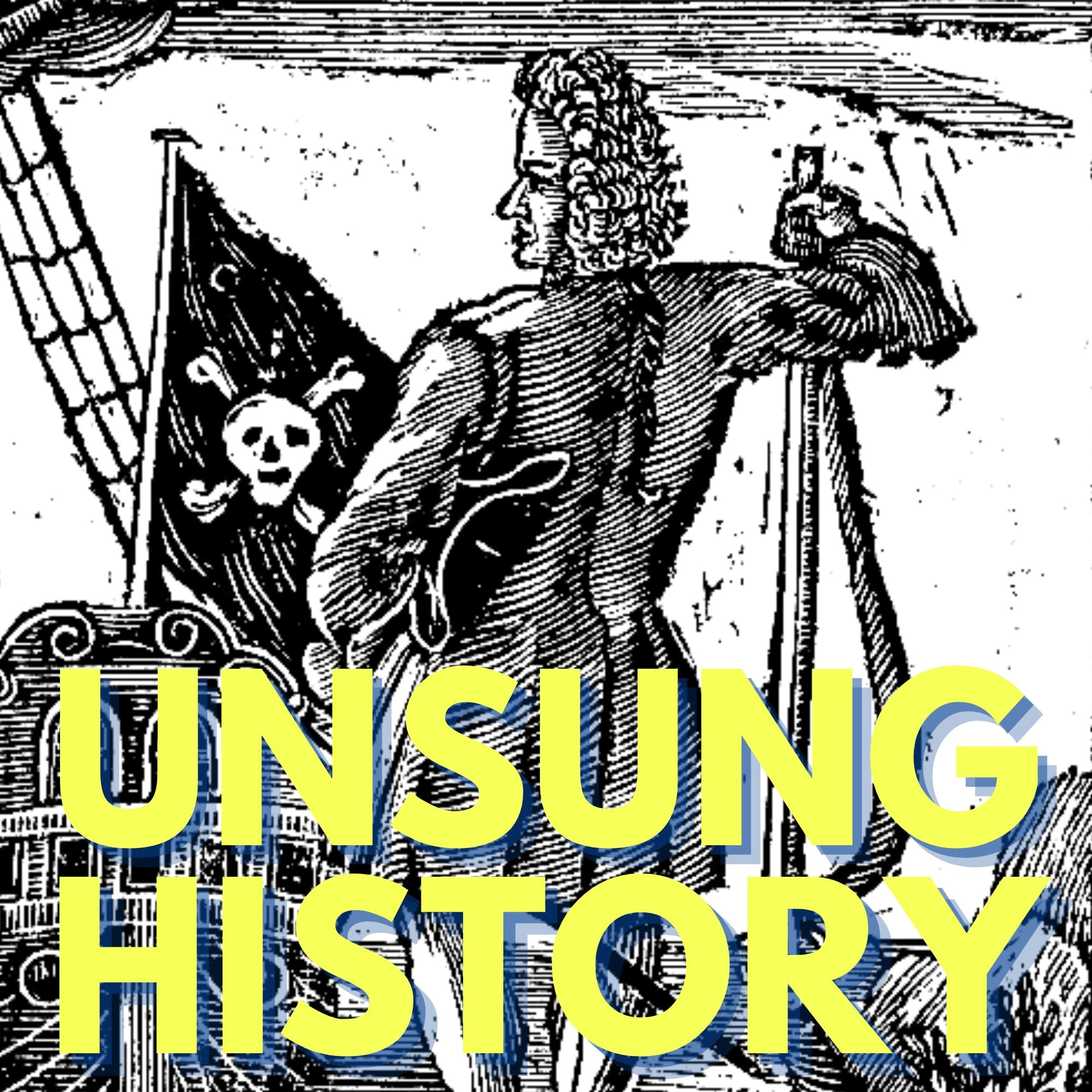
Unsung HistoryStede Bonnet, the Gentleman PirateStede Bonnet lived a life of luxury in Barbados, inheriting from his father an over 400-acre sugarcane plantation, along with 94 slaves. But in late 1716, when he was 29 years old, Bonnet decided to leave behind his plantation, his wife, and his three surviving children, all under the age of 5, to become a pirate, despite having no experience even captaining a ship. As Captain Charles Johnson put it in A General History of the Pyrates: “He had the least Temptation of any Man to follow such a Course of Life, from the Condition of his Circumstances,” blaming it on a “Disorder in his...
2022-12-2644 min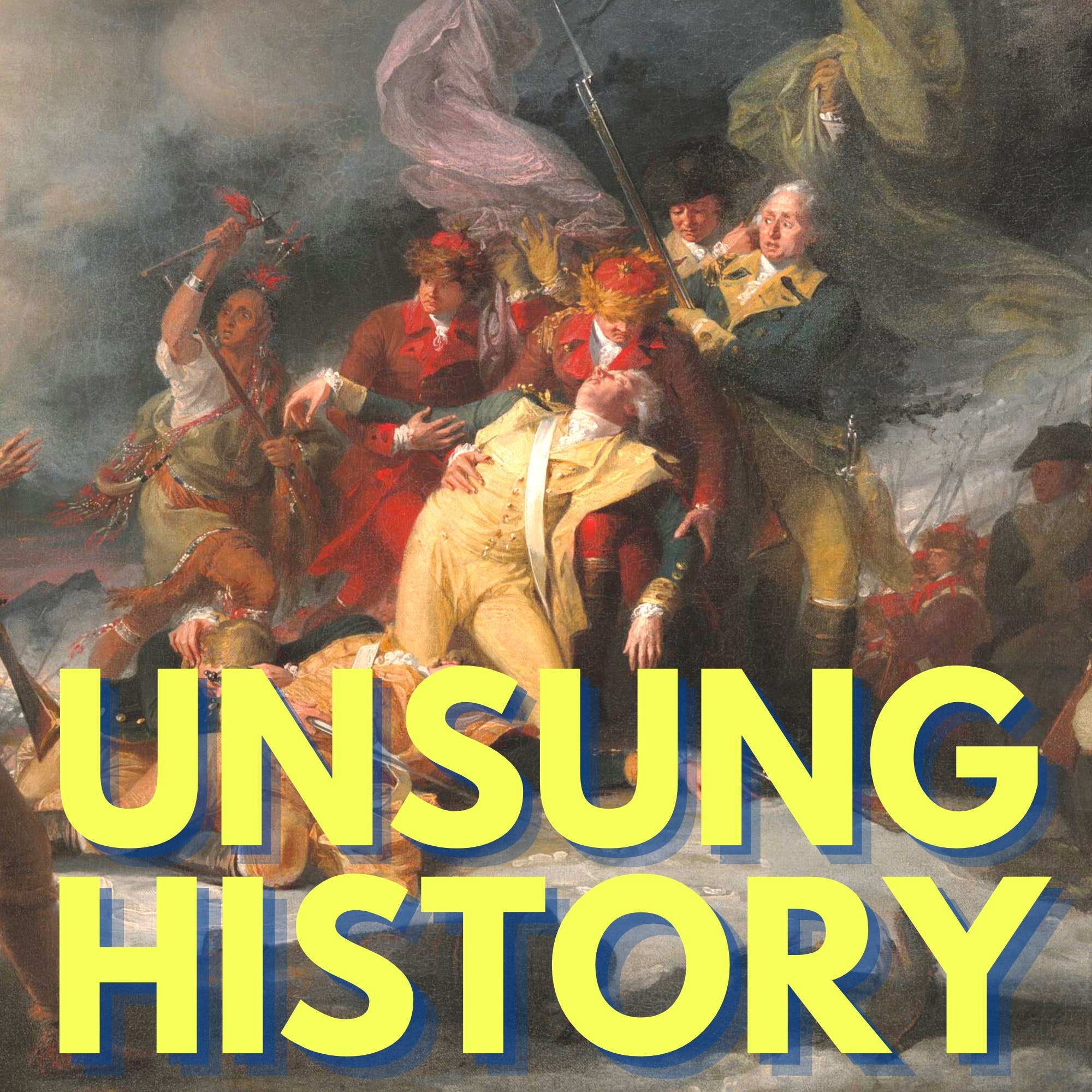
Unsung HistorySmallpox Inoculation & the American RevolutionIn 1775, a smallpox outbreak struck the Continental Northern Army. With many of the soldiers too sick to fight, their attempted capture of Quebec on December 31, 1775, was a devastating failure, the first major defeat of the Revolutionary War for the Americans, and cost General Richard Montgomery his life. Eventually, George Washington, the Commander in Chief of the Continental Army, realized that the only way to avoid repeated outbreaks was to order mass inoculation of the amy, a controversial and risky decision that proved successful. Joining me to help us learn more about smallpox inoculation during t...
2022-12-1948 min
Unsung HistoryThe Sea Islands Hurricane of 1893On August 27, 1893, a massive hurricane struck the coast of South Carolina and Georgia, battering the Sea Islands and Lowcountry through the next morning. Around 2,000 people in the thriving African American community perished that night, and many more died in the coming days and weeks as the impacts of the storm continued to be felt. The Red Cross, led by Clara Barton, organized relief efforts in conjunction with the local communities but with little money, as both the state legislature and the US Congress declined appeals to help.Joining me to help us understand more a...
2022-12-1249 min
Unsung HistoryThe Rise of the Labor Movement & Employer Resistance in the Late 19th CenturyAfter the Civil War, the simultaneous shift in the labor economy of the Southern United States and the second industrial revolution led to a growing interest in labor organizing. Newly formed labor organizations led a combined 23,000 strikes between 1881 and 1900. Employers noticed, and fought back, sometimes literally, employing Pinkerton agents to break strikes, rounding up and imprisoning or deporting union employees, and using various forms of intimidation against workers. Joining me to help us learn much more about the story of employers and elites resisting labor rights is Dr. Chad. Pearson, a lecturer at the Un...
2022-12-0540 min
Unsung HistorySingle Irish Women & Domestic Service in late 19th Century New York CityAs many as two million Irish people relocated to North America during the Great Hunger in the mid-19th Century. Even after the famine had ended, Irish families continued to send their teenaged and 20-something children to the United States to earn money to mail back to Ireland. In many immigrant groups, it was single men who immigrated to the US in search of work, but single Irish women, especially young women, came to the US in huge numbers. Between 1851 and 1910 the ratio of men to women arriving in New York from Ireland was roughly equal. Irish women often...
2022-11-2843 min
Unsung HistoryKeeping Secrets in the 1950sAmericans in the 1950s, yearning to return to normalcy after the Great Depression and World War II, got married, had lots of kids, and used their newly middle-class status to buy cookie-cutter houses in the suburbs. But not everyone conformed to the white middle class American Dream. Black Americans were largely excluded from suburban housing and the benefits of the GI Bill; girls who became pregnant out of wedlock were hidden from sight; children with developmental disabilities were sent to institutions; and gay men hid their homosexual attractions for fear of ostracization, harassment, and even legal consequences. The secrets...
2022-11-2145 min
Unsung HistoryGordon MerrickIn 1970, writer Gordon Merrick published The Lord Won’t Mind, advertised as “the first homosexual novel with a happy ending,” his fifth novel but first to focus on a gay romance story. The novel was a hit and stayed on the New York Times bestseller list for 16 weeks. Critics dismissed the work as fantastical, but Merrick, who had been a Broadway actor, newspaper reporter, and American spy before turning novelist, was writing what he knew. Despite his commercial success and enduring fan base, Merrick’s contributions have been ignored and forgotten.Joining me now to help u...
2022-11-1446 min
Unsung HistoryElsie RobinsonAs a girl born in 1883 to a family who couldn’t afford to send her to college, Elsie Robinson had limited options. To escape the drudgery of small-town life and then a stifling marriage, Elsie wrote. And wrote. And wrote. When her asthmatic son was home sick from school, she wrote and illustrated stories to entertain him. When she needed to make money to support herself and her son after her divorce, she wrote again. Eventually, her prolific writing caught the attention of the Hearst media empire, and Elsie became the most-read woman writer in America and the highest-paid wo...
2022-11-0741 min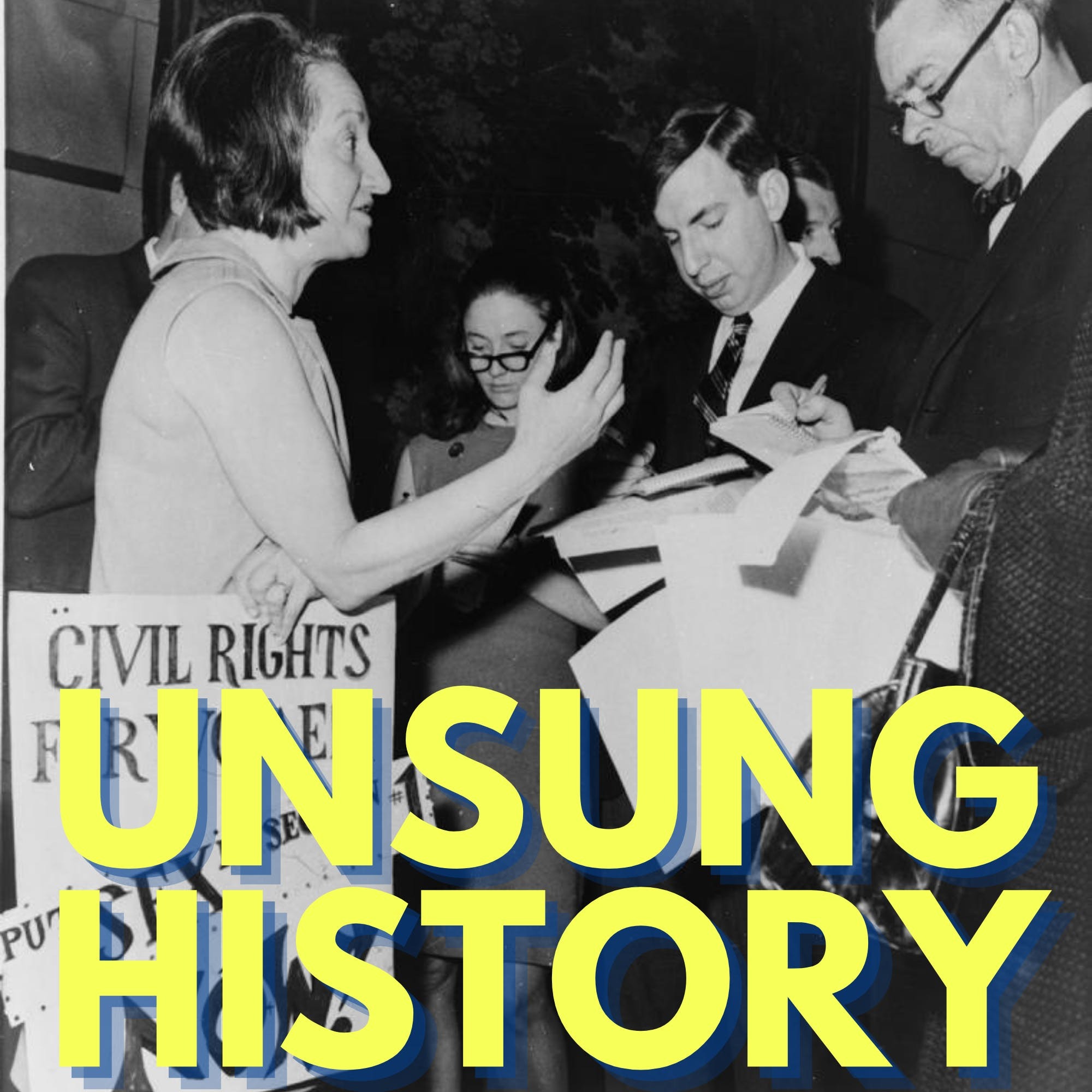
Unsung HistoryThe Politics of Reproductive Rights in 1960s & 1970s New YorkPrior to the Roe v. Wade decision in 1973, much of the focus of reproductive rights organizing in the US was done in the states, and nowhere was that more effective than in New York, where leftist feminists in groups like Redstockings and more mainstream activists in groups like the National Organization for Women (NOW) together pushed the state legislature to enact the most liberal abortion law in the country by early 1970. The wide range of reproductive rights activism in New York also included the headquarters for both the Clergy Consultation Service, which helped women find safe abortion care, and...
2022-10-3149 min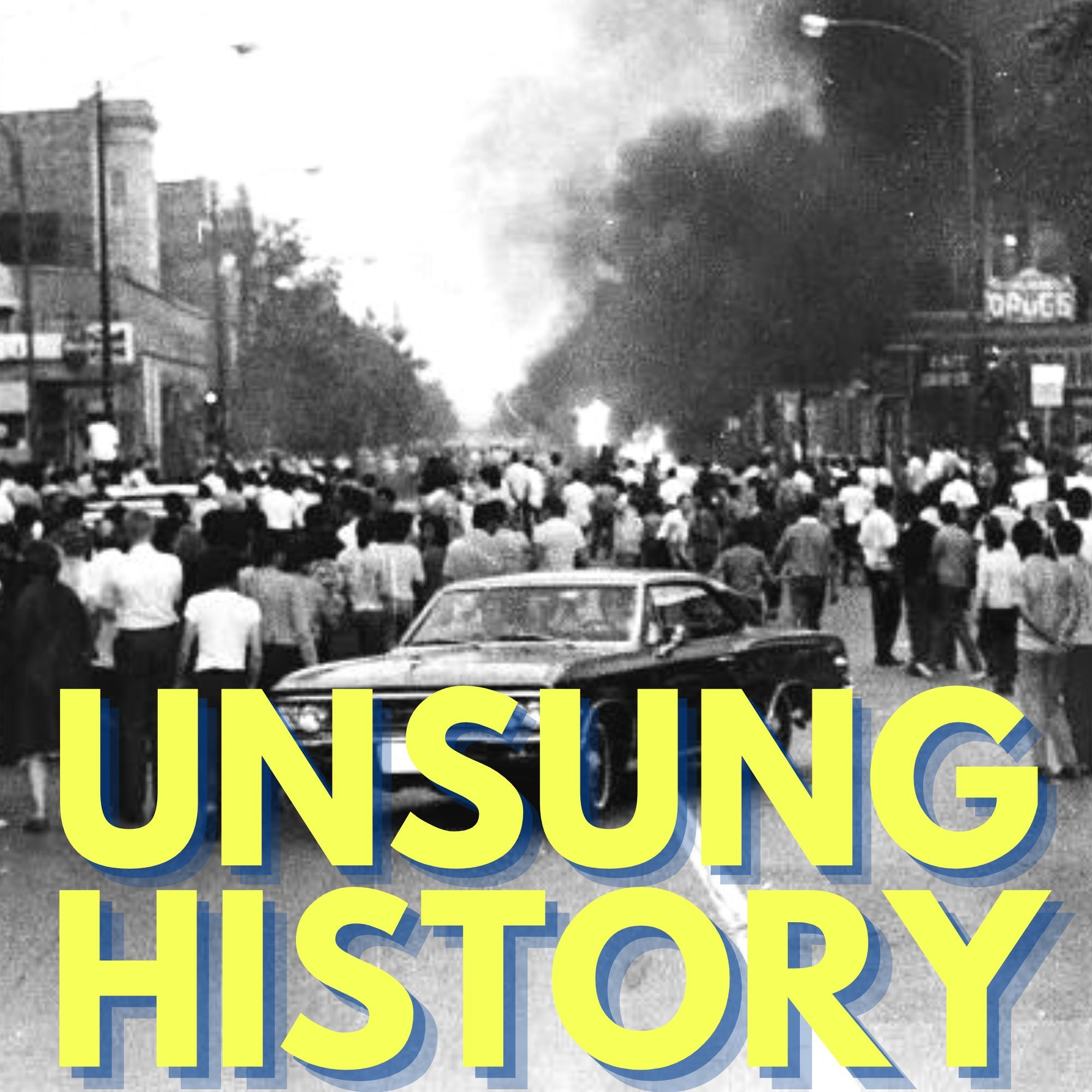
Unsung HistoryThe 1966 Division Street Uprising & the Puerto Rican community in ChicagoIn 1966, Chicago Mayor Richard J. Daley declared that the first week of June would be known as “Puerto Rican Week,” culminating in the first Puerto Rican Parade, to honor the growing Puerto Rican population in the city. After the parade, while people were still celebrating, police shot a Puerto Rican man in the leg, following a pattern of police violence against the Puerto Rican community, which sparked a three-day uprising in the Humboldt Park neighborhood that changed Puerto Rican history in Chicago.Joining me to help us understand the Puerto Rican community in Chicago both...
2022-10-2451 min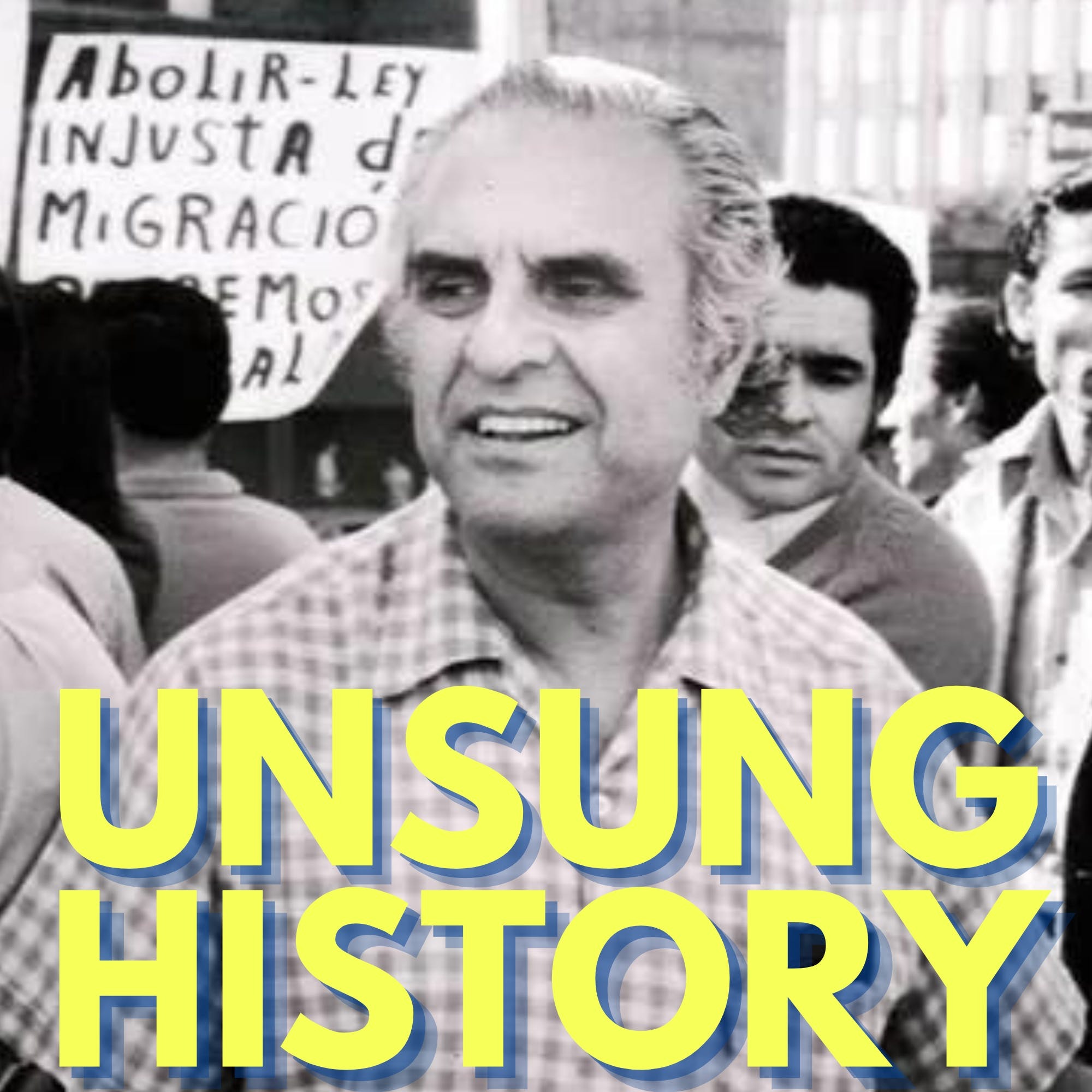
Unsung HistoryBert CoronaLabor leader and immigrant rights activist Bert Corona viewed Mexican Americans and Mexican immigrants in the United States, both with and without documentation, as one people without borders, and he understood that their struggles were connected. While other Mexican American labor leaders were campaigning against undocumented workers, Corona fought to shift the opinions of Mexican Americans toward support for the undocumented and helped create a pro-immigrant consciousness among Latinos in the United States.Joining me to help us learn more about the life of Bert Corona is Dr. Eladio B. Bobadilla, Assistant Professor of H...
2022-10-1747 min
Unsung HistoryThe Effect of the Mexican Revolution on Mexican Immigration to the U.S.The Mexican Revolution in the early 20th Century was a pivotal moment in Mexican history, and it was also a pivotal moment in United States history, as huge numbers of Mexicans fled war-torn Mexico and headed to the US border. Many Mexican Americans in the US today are the descendants of refugees fleeing the Revolution.To understand more about the experience of immigrants who came to the United States during the Mexican Revolution, I’m speaking in this episode with writer Alda P. Dobbs, author of middle grade novels Barefoot Dreams of Petra Luna and ...
2022-10-1035 min
Unsung HistorySouthwest Borderlands in the 19th CenturyThrough the 19th Century, the US-Mexico border moved repeatedly, and the shifting borderlands were a space of cultural and economic transition that often gave rise to racialized gendered violence. In this episode I speak with Dr. Bernadine Hernández, Associate Professor of American Literary Studies at the University of New Mexico, an activist with fronteristxs, and author of Border Bodies: Racialized Sexuality, Sexual Capital, and Violence in the Nineteenth-Century Borderlands.Our theme song is Frogs Legs Rag, composed by James Scott and performed by Kevin MacLeod, licensed under Creative Commons...
2022-10-0347 min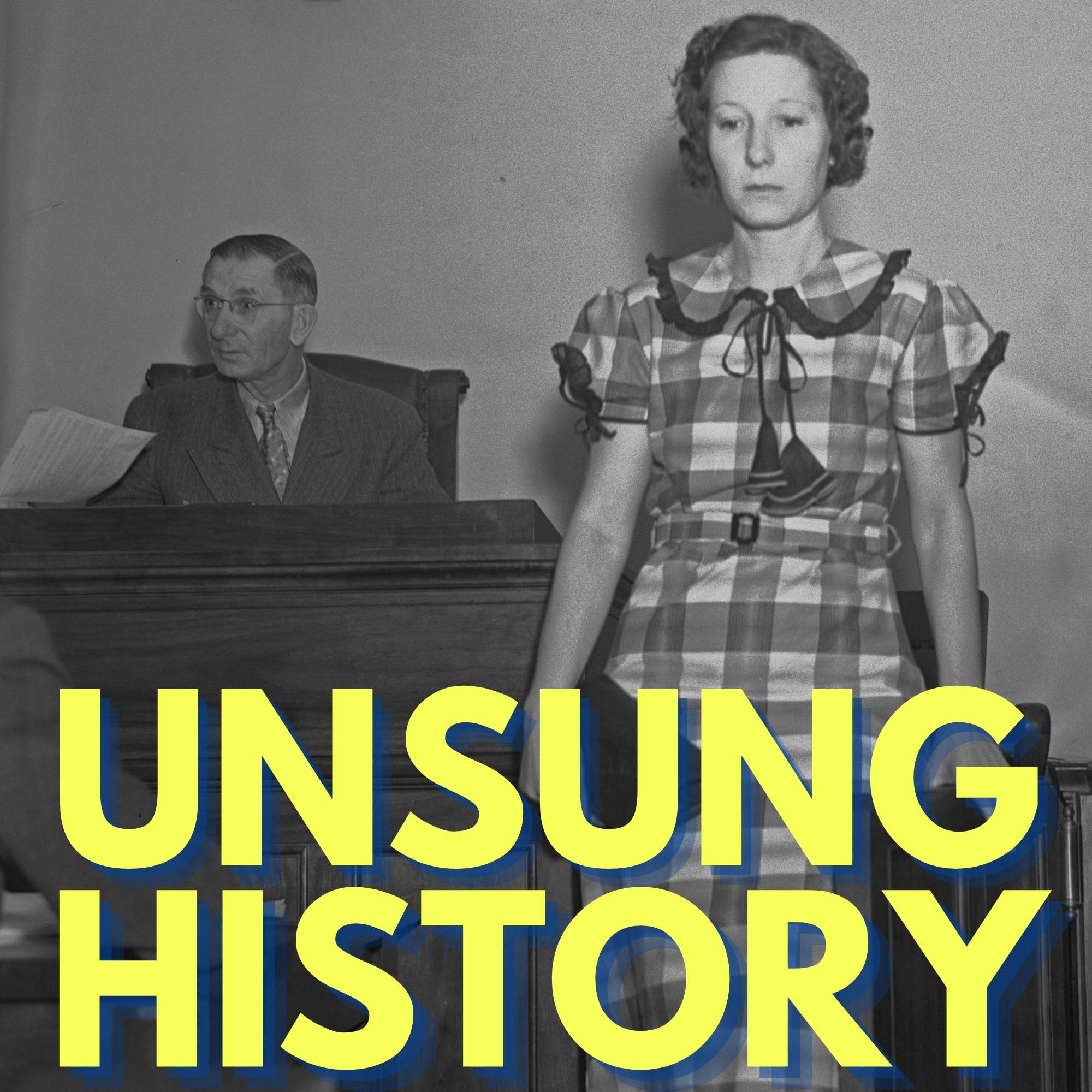
Unsung HistoryThe Pacific Coast Abortion RingIn mid-1930s, pregnant women in cities in California, Oregon, and Washington could obtain safe surgical abortions in clean facilities from professionals trained in the latest technique. The only catch? The abortions were illegal.The syndicate that provided these abortions was the Pacific Coast Abortion Ring, which operated from 1934 to 1936 with clinic locations in Seattle, Washington; Portland, Oregon; and San Diego, Long Beach, Hollywood, Los Angeles, San Francisco, Oakland, and San Jose, California. It employed more than thirty people, which included not just doctors but also receptionists, nurses, and steerers who referred women to t...
2022-09-2652 min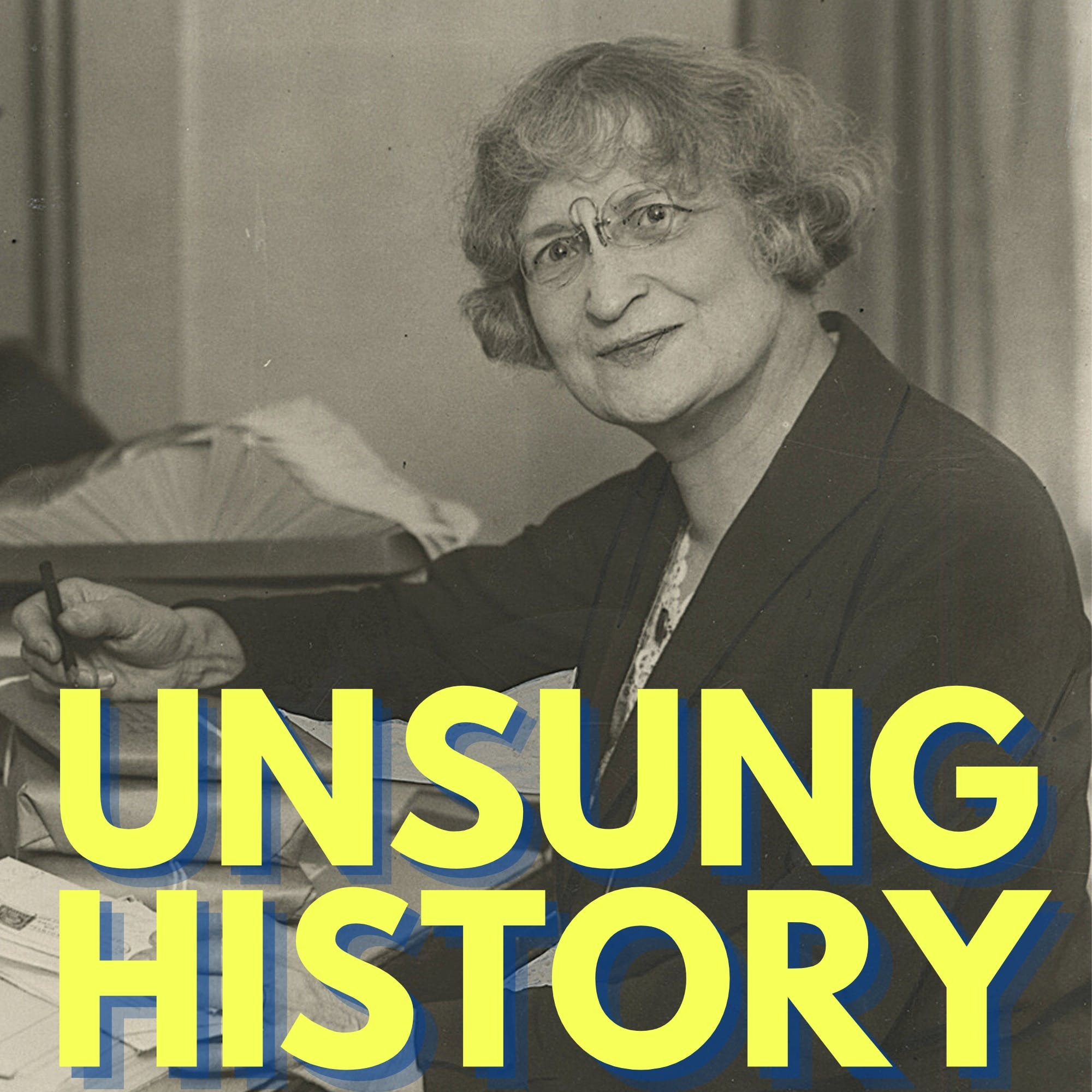
Unsung HistoryMary Ware Dennett & the Birth Control MovementFor birth control advocate Mary Ware Dennett, the personal was political. After a difficult labor and delivery with her third child, a physician told Mary Ware Dennett she should not have any more children, but he told her nothing about how to prevent pregnancy. Dennett’s husband began an affair with a client of his architectural firm, destroying their marriage, and Dennett devoted her work to ensuring that other couples could receive information about birth control. A 1930 federal court case against her, United States v. Dennett, opened the door to widespread distribution of birth control information in the US....
2022-09-1953 min
Unsung HistoryAbortion in 18th Century New EnglandIn 1742, in Pomfret, Connecticut, 19-year-old Sarah Grosvenor discovered she was pregnant, the result of a liaison with 27-year-old Amasa Sessions. Instead of marrying Sarah, Amasa provided her with a physician-prescribed abortifacient, what the youth of Pomfret called “taking the trade." When that didn’t work to end the pregnancy, the physician attempted a manual abortion, which led to Sarah’s death. Three years later, the physician was tried for “highhanded Misdemeanour." The surviving trial documentation gives us an unusually detailed look into the reproductive lives of Connecticut youths in the mid-18th Century. Joining me in thi...
2022-09-1242 min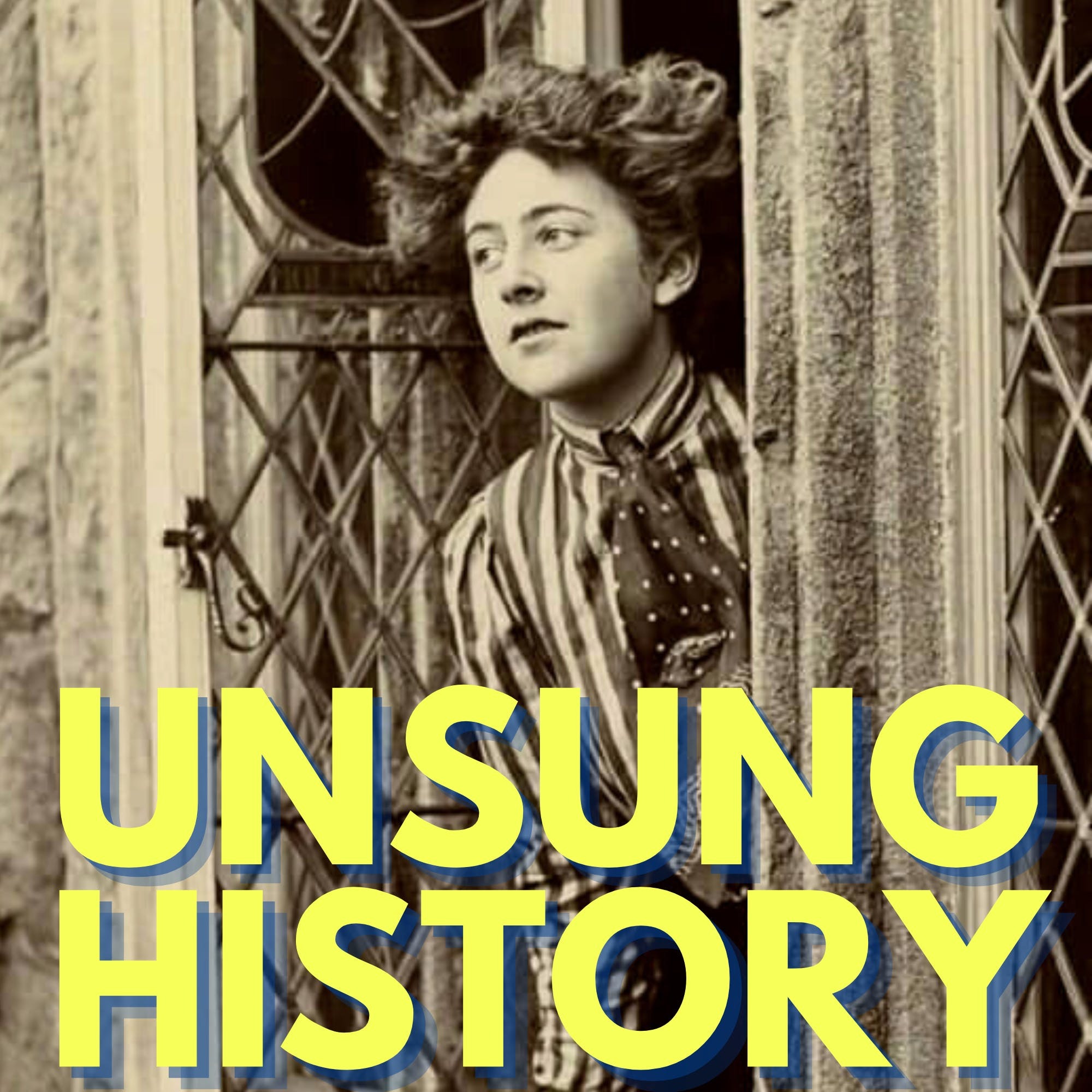
Unsung HistoryAgatha ChristieAgatha Christie is the best-selling novelist of all time, whose books have been outsold only by the Bible and Shakespeare. You can probably name several of her books and recurring characters, but how much do you know about Agatha Christie herself? In our final British History episode, we look at Agatha Christie’s life, in the hospital dispensary, at home with her daughter, abroad on archeological digs, and behind the typewriter.Joining me in this episode to help us learn more about Agatha Christie is historian Dr. Lucy Worsley, OBE, Chief Curator at Historic Roy...
2022-09-0543 min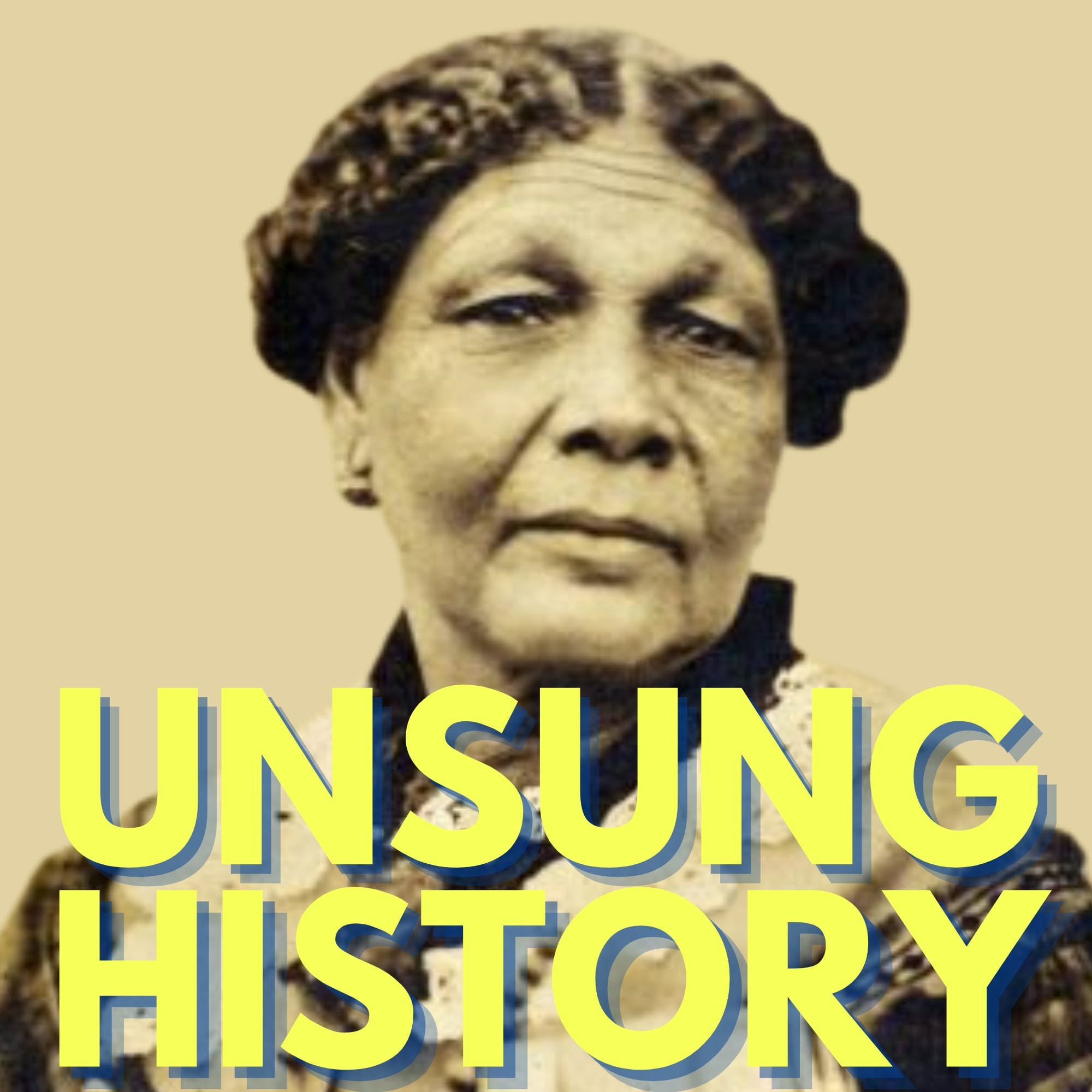
Unsung HistoryMary SeacoleWhen the United Kingdom joined forces with Turkey and France to declare war on Russia in March 1854, Jamaican-Scottish nurse Mary Seacole decided her help was needed. When the British War Office declined her repeated offers of help, she headed off to Crimea anyway and set up her British Hotel near Balaklava. The British Hotel, which opened in March 1855, was a combination general store, restaurant, and first aid station, and the British soldiers and officers came to love Mary and call her “Mother Seacole.”Joining me in this episode to help us learn more about Mary...
2022-08-2948 min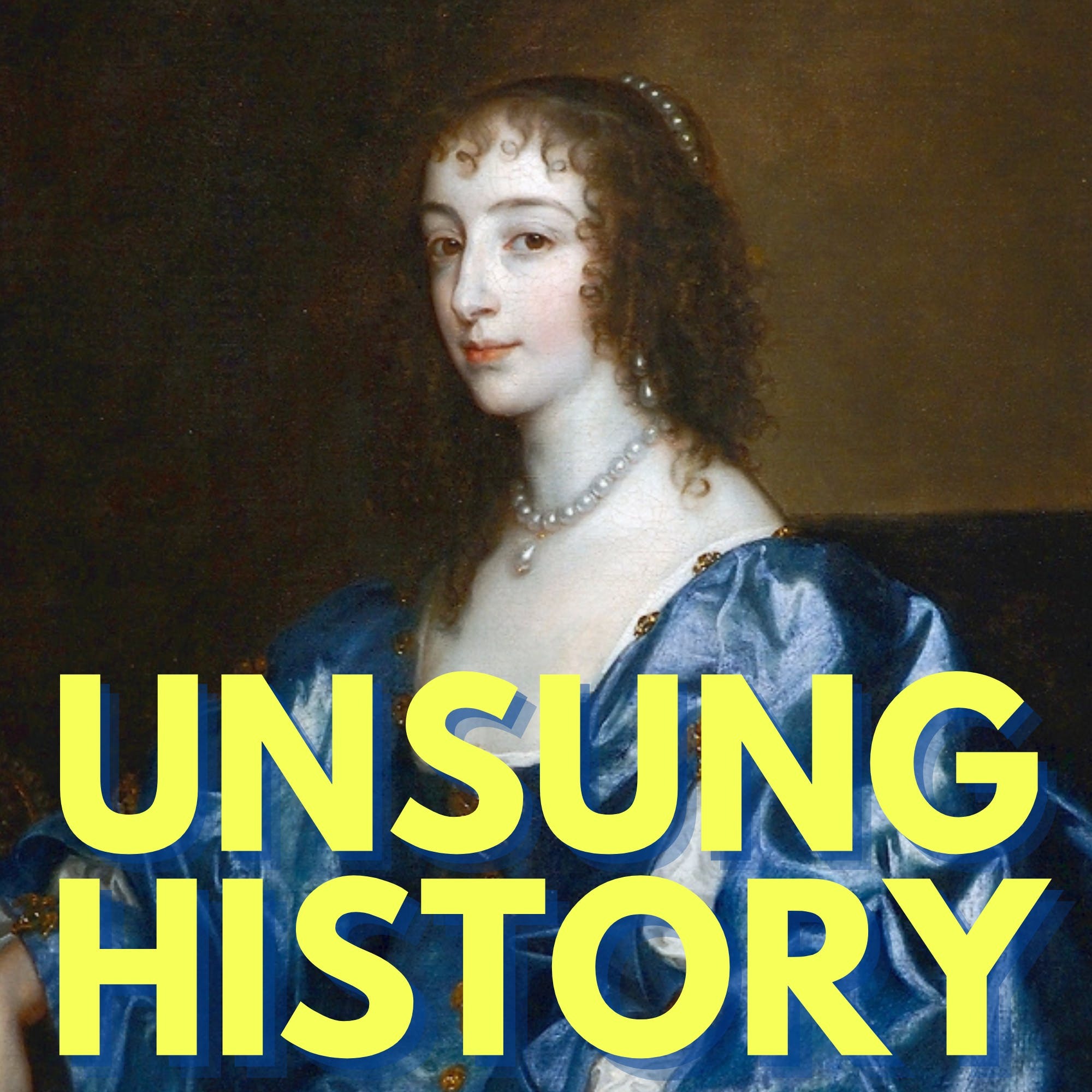
Unsung HistoryHenrietta MariaHenrietta Maria, the French Catholic wife of King Charles I of England, Scotland, and Ireland in the 17th Century, was called a “Popish brat of France” by her British subjects, blamed for the English Civil War, and seen as a mannish and heartless mother. The reality is, of course, much more nuanced. Henrietta Maria fiercely loved Charles and their children and fought to protect them in any way she could during a time of upheaval and violence. In this episode we push past the caricature of Henrietta Maria to see the real, complicated, person she was.
2022-08-2242 min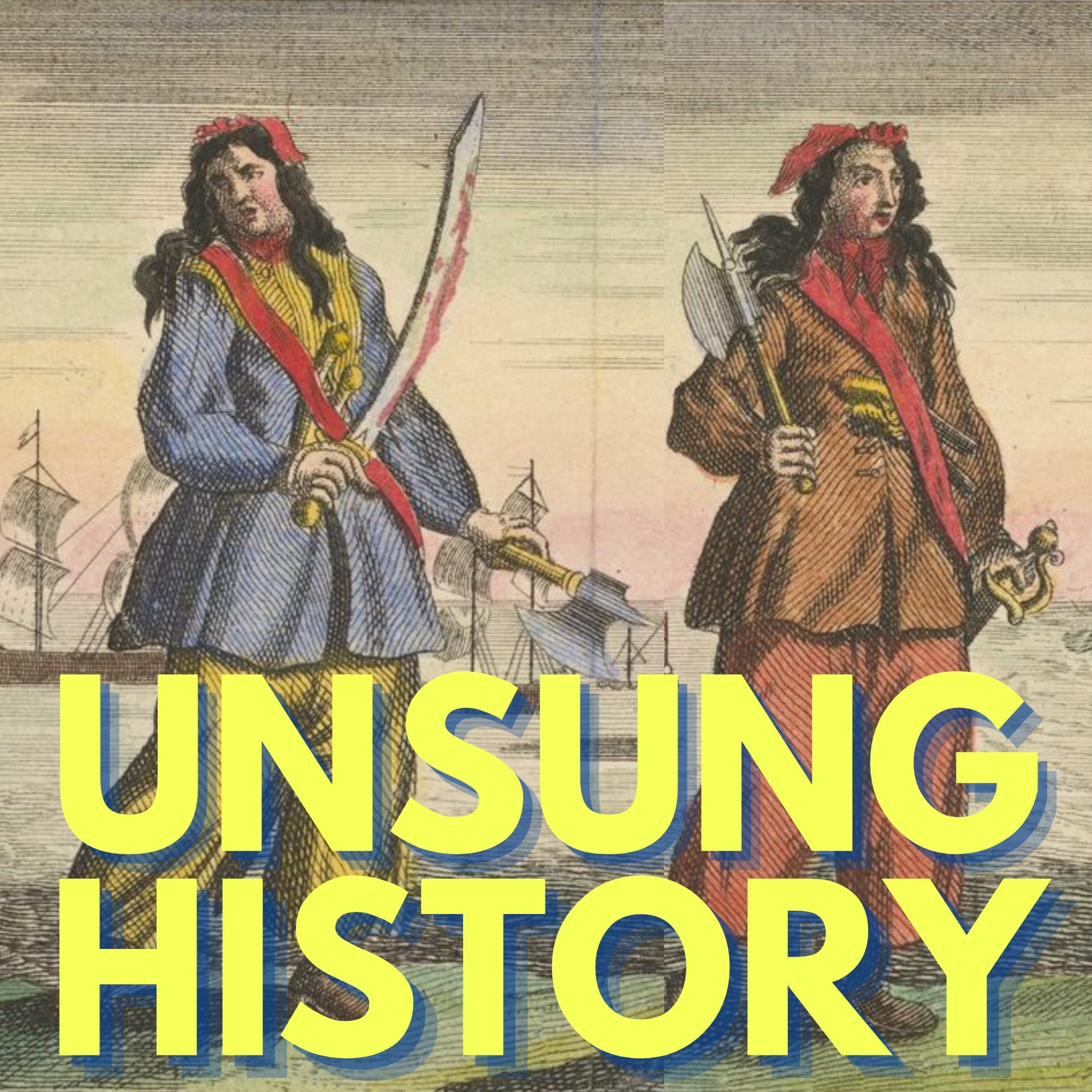
Unsung HistoryAnne Bonny & Mary Read, Pirate QueensDuring the Golden Age of Pirates, two fierce and ruthless pirates stood apart from the rest, despite their brief careers. The only women in their crew, Anne Bonny and Mary Read were aggressive fighters to the end, refusing to surrender even when their captain called for quarter. Joining me to discuss Anne Bonny and Mary Read is pirate expert Dr. Rebecca Simon, author of the new book, Pirate Queens: The Lives of Anne Bonny & Mary Read.Our theme song is Frogs Legs Rag, composed by James Scott and performed by Ke...
2022-08-1542 min
What Can I Do"You don’t need a 12 point plan to get started" (w/ Lila Nordstrom of StuyHealth and Kelly Therese Pollock)Feeling down about the state of the world? Looking for substantive ideas about how to take action? We’re here to help! In this first episode, Lila and Kelly discuss their own activist journeys, what it takes to move beyond voting and donating, what first steps can look like, and how to figure out where your skills can be of use. Episode Links:Order Lila’s book: Some Kids Left Behind: A Survivor's Fight for Health Care in the Wake of 9/11.Follow Lila on TwitterFollow Kelly on TwitterFollow the podcast on Twitter at @WhatCanIDoPodTo contact...
2022-08-1023 min
Unsung HistoryThe Women who Programmed the ENIACDuring World War II, the United States Army contracted with a group of engineers at the University of Pennsylvania Moore School of Electrical Engineering to build the ENIAC, the world’s first programmable general-purpose electronic digital computer in order to more quickly calculate numbers for ballistics tables. Once the top-secret device was built, someone needed to figure out how to program the more than 17,000 vacuum tubes, 70,000 resistors, 10,000 capacitors, 6,000 switches, and 1,500 mechanical relays so that the calculations could be run. Six women mathematicians who had been manually calculating the figures, were chosen to develop the programming, which they worked out be...
2022-08-0836 min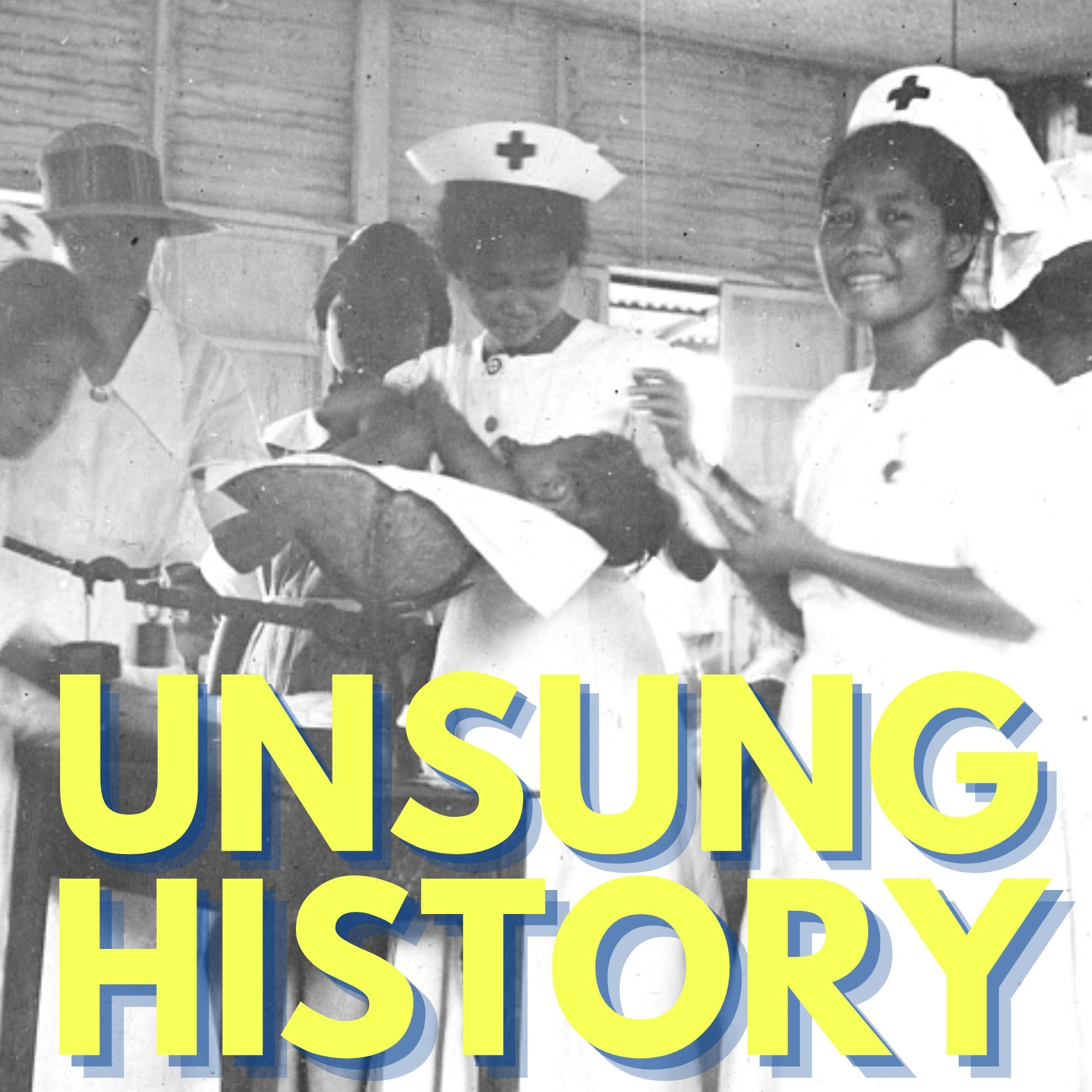
Unsung HistoryFilipino Nurses in the United StatesA February 2021 report by National Nurses United found that while Filipinos make up 4% of RNs in the United States, they accounted for a stunning 26.4% of the registered nurses who had died of COVID-19 and related complications. Why are there so many Filipino nurses in the United States and especially so many of the frontlines of healthcare? To answer that question, we need to look at the history of American colonization of The Philippines, United States immigration policies, and the establishment of the Medicare and Medicaid programs in the US. Joining me to help us l...
2022-08-0143 min
Unsung HistoryThe Townsend Family LegacyWhen Alabama plantation owner Samuel Townsend died in 1856, he willed his vast fortune to his children and his nieces. What seems like an ordinary bequest was anything but, since Townsend’s children and nieces were his enslaved property. Townsend, who knew the will would be challenged in court, left nothing to chance, hiring the best lawyer he could find to ensure that his legatees received both their freedom and the resources they would need to survive in a country that was often hostile to free African Americans.To learn more about the Townsend Family, I’...
2022-07-2545 min
Unsung HistoryThe Unusual Codicil in Benjamin Franklin's WillWhen Benjamin Franklin died in April 1790, his last will contained an unusual codicil, leaving 1000 pounds sterling each to Philadelphia and Boston, to be used in a very specific way that he hoped would both help tradesmen in the two cities and eventually leave the cities, and their respective states, with fortunes to spend on public works 200 years later. At a moment when it wasn’t clear whether the United States would survive at all, Franklin made a gamble on the American spirit.To learn more about the fascinating tale of Ben Franklin’s will, I’m...
2022-07-1845 min
Unsung HistoryDale Evans, Queen of the WestDale Evans is probably best known as the Queen of the West, the wife and co-star of the King of Cowboys, Roy Rogers. But before she ever met Roy, Dale had a successful career in singing, songwriting, and acting, and she had plans to be an even bigger star in musicals, which to Dale, meant not Westerns. This week we do a deep dive into the life of Dale Evans and how she became a cowgirl, with historian Dr. Theresa Kaminski, author of the new book, Queen of the West: The Life and Times of D...
2022-07-1147 min
Unsung HistoryIndependence DayOn July 4, Americans will eat 150 million hot dogs, spend $1 billion on beer, and watch 16,000 fireworks displays (and those are just the official ones). But why do we celebrate on July 4, when did it become a national holiday, and did John Adams eat hot dogs?Joining me for the story of the Declaration of Independence, why July 4th might not be the right date to be celebrating, and who the signers actually were, is historian, podcaster, and DC tour guide, Rebecca Fachner.Our theme song is Frogs Legs Rag, composed by J...
2022-07-0436 min
Unsung HistoryThe 1966 Compton's Cafeteria RiotOn a hot weekend night in August 1966 trans women fought back against police harassment at Compton’s Cafeteria in the Tenderloin District of San Francisco. Although the Compton’s riot didn’t spark a national movement the way Stonewall would three years later, it did have an effect, leading to the creation of support services for transgender people in San Francisco, and a reduction in police brutality against the trans community.Joining me to discuss the riot, its causes, and its aftermath, is historian Dr. Susan Stryker, co-writer and co-director of the Emmy-winning 2005 documentary, Screamin...
2022-06-2751 min
Unsung HistoryTwo-Spirit People in Native American CulturesIn the summer of 1990, at the third annual Native American/First Nations gay and lesbian conference, in Winnipeg, Manitoba, the term Two Spirit was established. An English translation of the Northern Algonquin term niizh manitoag, Two Spirit describes masculine and feminine qualities within a single person. As a pan tribal term, Two Spirit both connected organizers across different Native nations and also helped them re-discover the traditional terminology used in their own cultural history.Joining me to help us understand more about the Two-Spirit people is Dr. Gregory Smithers, a American history at Virginia Com...
2022-06-2039 min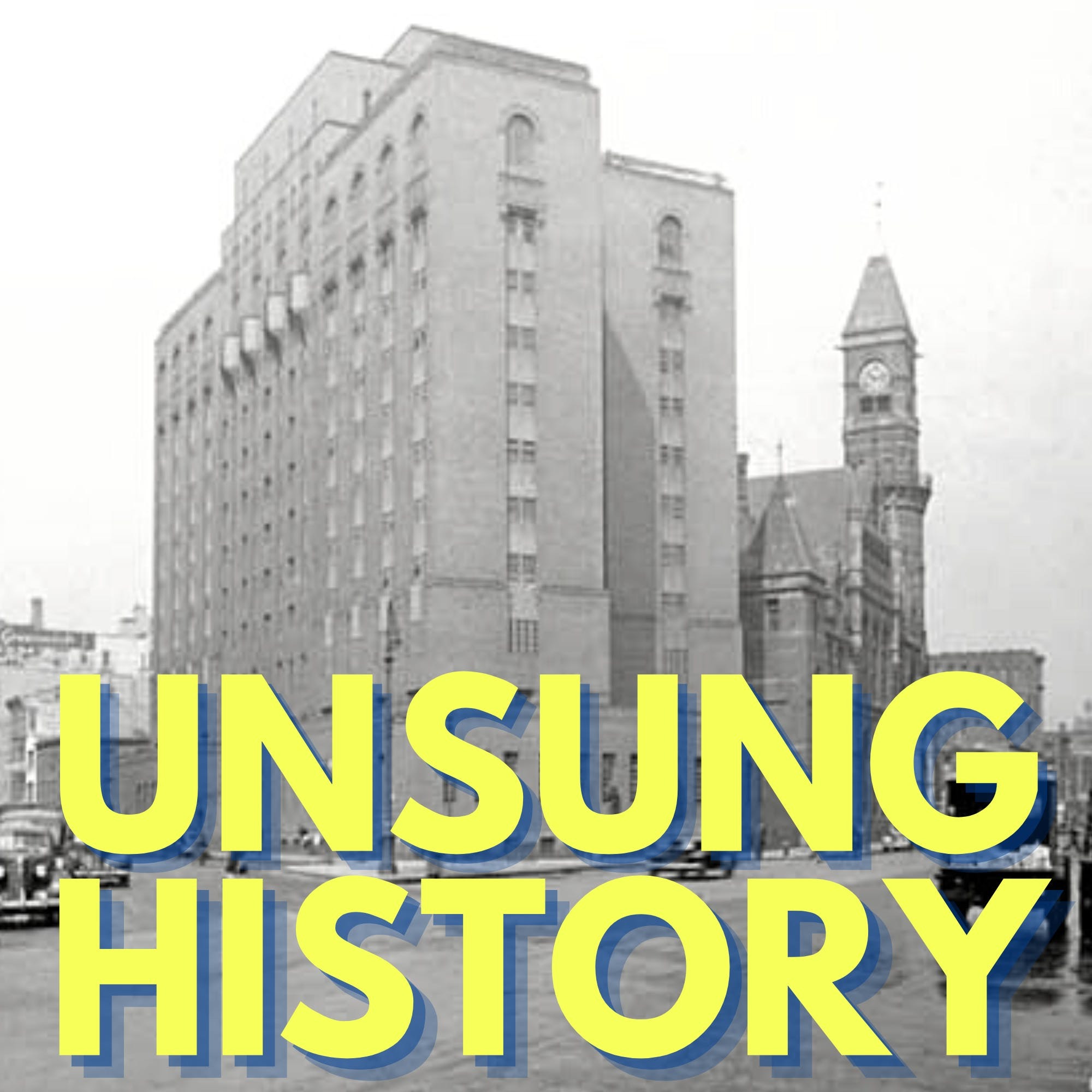
Unsung HistoryThe Women's House of Detention in Greenwich VillageThe 12-story Women’s House of Detention, situated in the heart of Greenwich Village in New York City, from 1932 to 1974, was central to the queer history of The Village. The House of D, as it was known, housed such inmates as Angela Davis, Afeni Shakur, Andrea Dworkin, and Valerie Solanas, and was formative in their thinking and writing. On the night of the Stonewall Riots, the incarcerated women and transmaculine people in the House of D, a few hundred feet away from The Stonewall Inn, joined in, chanting “Gay power!” and lighting their possessions on fire and throwing them out th...
2022-06-1351 min
Unsung HistoryThe Queer History of the Women's Suffrage MovementQueer suffragists were central to the women’s suffrage movement in the United States from its earliest days. However, in a movement that placed great importance on public image in service of the goal of achieving the vote, queer suffragists who pushed the boundaries of “respectability” were sometimes ostracized, and others hid their queerness, or had it erased by others.Joining me to help us learn about queer suffragists is historian Dr. Wendy Rouse, Associate Professor in History at San Jose State University. Dr. Rouse is the author of a new book from New York Un...
2022-06-0640 min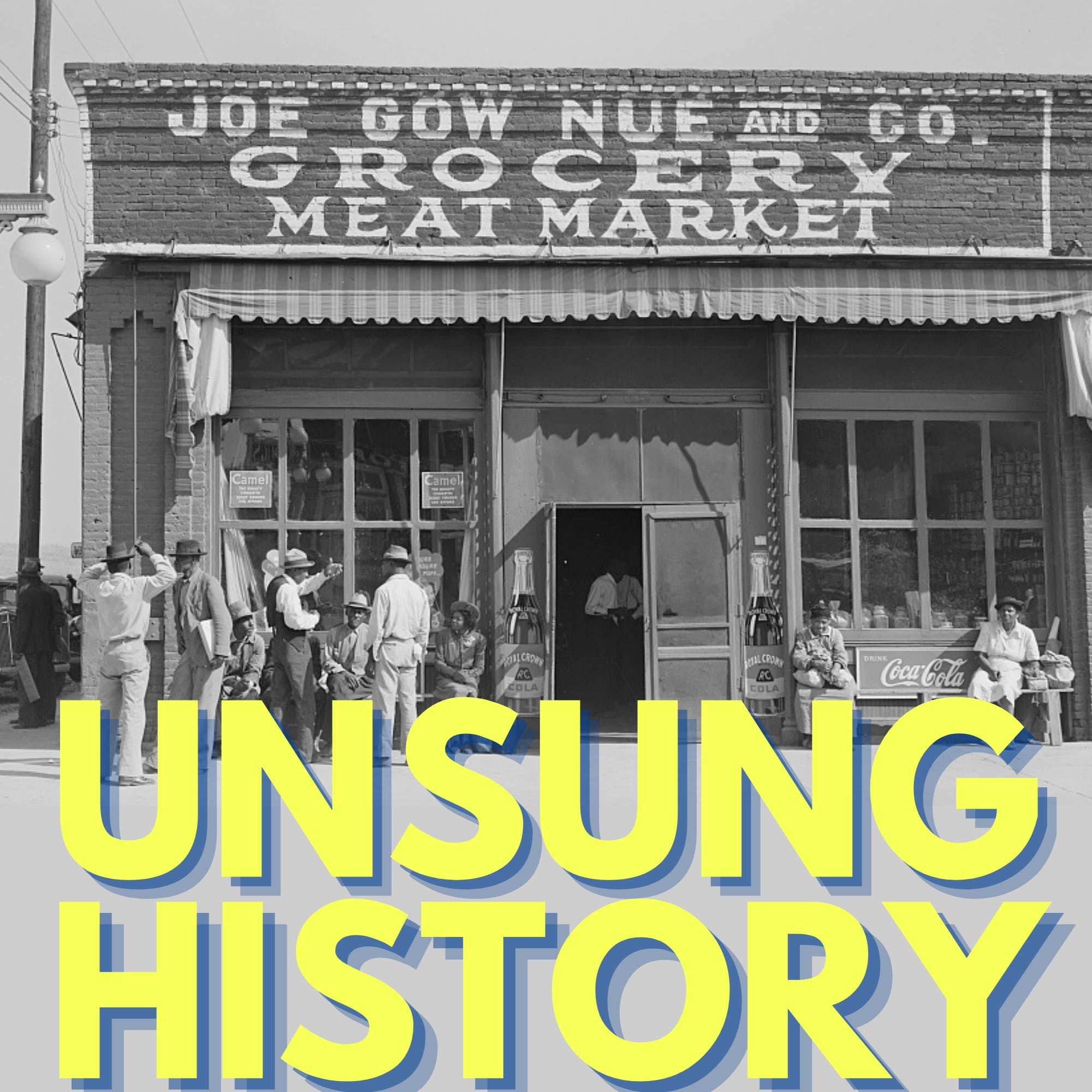
Unsung HistoryChinese Grocery Stores in the Mississippi DeltaDuring Reconstruction, cotton planters in the Mississippi Delta recruited Chinese laborers to work on their plantations, to replace the emancipated slaves who had previously done the hard labor. However, the Chinese workers quickly learned that they couldn’t earn enough money picking cotton to send back to their families, and they turned instead to running small grocery stores, filling a niche in the market of the Deep South. At one point, the city of Greenville, Mississippi, had 40,000 residents and 50 Chinese-owned grocery stores. Although the numbers of Chinese Americans living in the Mississippi Delta region had dwindled now, their legacy re...
2022-05-3043 min
Unsung HistoryPatsy MinkIn Patsy Mink’s first term in Congress in 1965, she was one of only 11 women serving in the US House of Representatives, and she was the first woman of color to ever serve in Congress. Mink was no stranger to firsts, being the first Japanese-American woman licensed to practice law in Hawaii, after being one of only two women in her graduating class at the University of Chicago Law School. She would later be the first Asian American to run for President. Mink leaned on her own experiences of sexism and racism in writing and...
2022-05-2350 min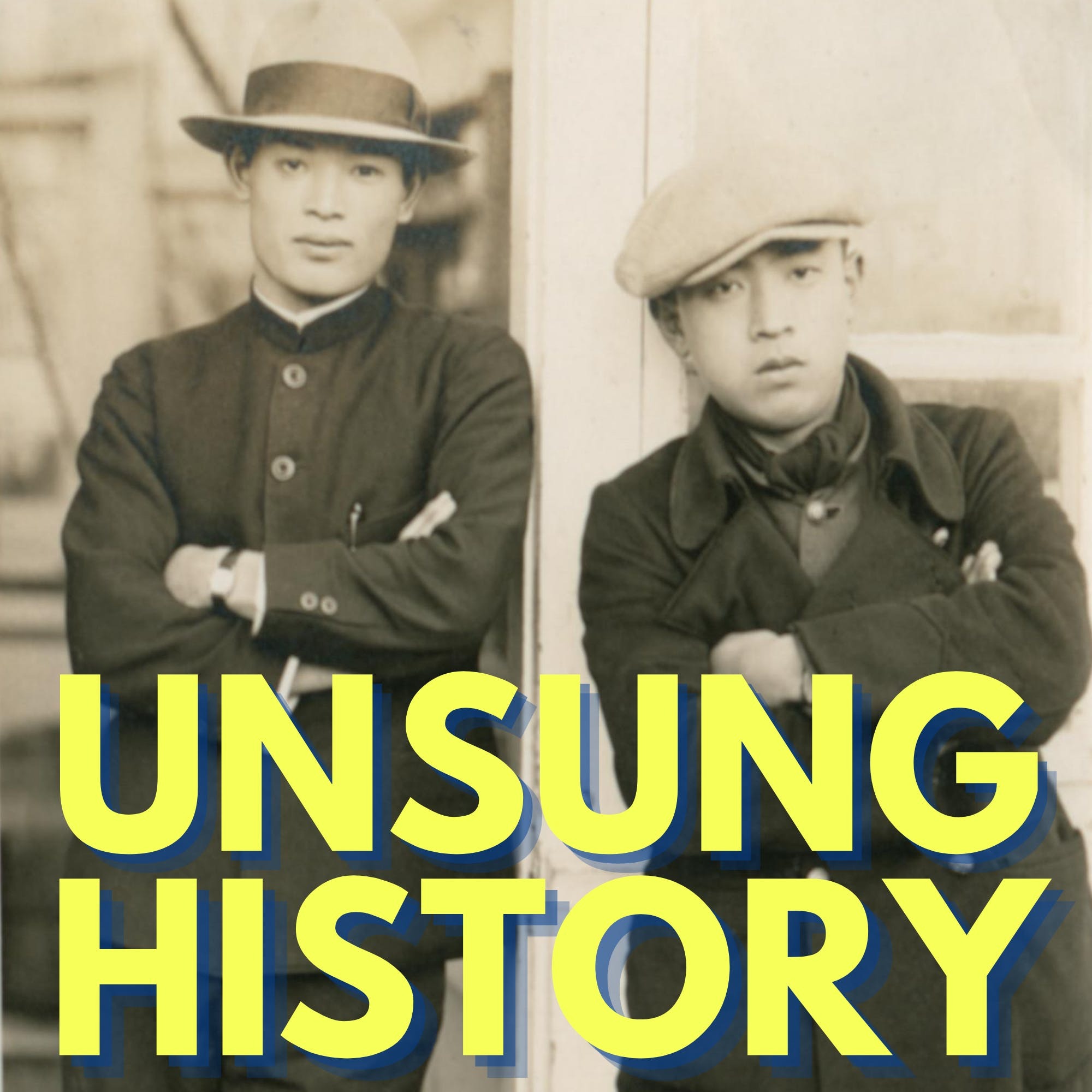
Unsung HistoryThe US-Born Japanese Americans (Nisei) who Migrated to JapanIn the decades before World War II, 50,000 of the US-born children of Japanese immigrants (a quarter of their total population) migrated from the United States to the Japanese Empire. Although these second generation Japanese Americans (called Nisei) were US citizens, they faced prejudice and discrimination in the US and went to Japan in search of a better life. Joining me to help us learn about the Nisei who returned to Japan, what motivated them, and the challenges they faced both in Japan and back in the US is Dr. Michael Jin, Assistant Professor of Glo...
2022-05-1646 min
Unsung HistoryThai Americans & the Rise of Thai Food in the United StatesThere are around 300,000 Thai Americans but almost 5,000 Thai restaurants in the United States. To understand how Thai restaurants became so ubiquitous in the US, we dive into the history of how Thai cuisine arrived in the US before Thai immigrants started to arrive in large numbers, and how Thai Americans capitalized on the popularity of their food to find their niche in the US economy.I’m joined in this episode by Associate Professor of Asian and Asian American Studies at the University of Nevada, Las Vegas, Dr. Mark Padoongpatt, author of Flavors of Empire...
2022-05-0947 min
Unsung HistoryMary Paik LeeMary Paik Lee (Paik Kuang Sun) was born in the Korean Empire on August 17, 1900, and was baptized by American Presbyterian minister Dr. Samuel Austin Moffett, one of the first American Presbyterian missionaries to come to Korea. In 1905, her family left Korea for Hawaii, fleeing the Japanese occupation of the Korean Peninsula. Late in her life, Mary wrote a memoir, recounting her family’s struggles in Hawaii and then California, where they faced discrimination and poverty, all while striving to make a better life and holding firm to their Presbyterian faith.I’m joined in this...
2022-05-0247 min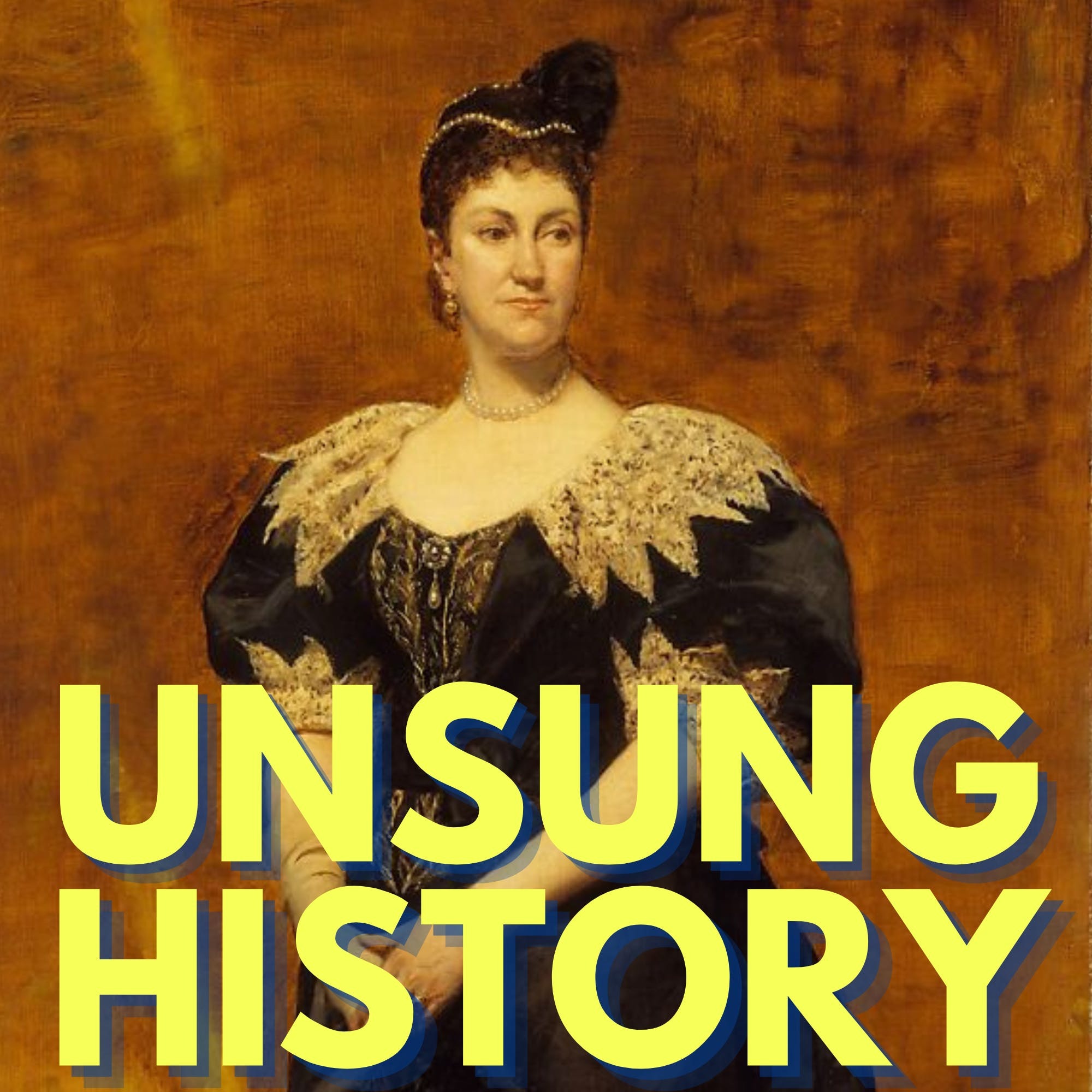
Unsung HistoryFrench Fashion in Gilded Age AmericaParis has a long history as the fashion capital of the world. In the late 19th Century, American women, like European women, wanted the latest in French fashion. The wealthiest women traveled to Paris regularly to visit their favorite couturiers, like the House of Worth and Maison Félix, to update their wardrobes. For those women who couldn’t afford to travel, Paris came to them, via international expositions, magazines, and department stores. I’m joined in this episode by art historian Dr. Elizabeth L. Block, author of Dressing Up: The Women Who Influenced French F...
2022-04-2542 min
Green Living with TeeCut the Toxins, Save the Species with Kelly Ryerson, the Glyphosate GirlDo you know that you are probably eating, drinking, and touching glyphosate all day, every day. Glyphosate is everywhere. It is in nearly all of our non-organic food. In most US cities, parks, schools, golf courses, and many athletic fields are showered in glyphosate. Glyphosate is found in and fed to babies in breast milk. What is the mega-consumption of glyphosate and associated formulations like Roundup doing to our bodies and those of our children? Kelly Ryerson is an environmental health writer, speaker, and ardent public health advocate. After alleviating her own chronic illness by eating a...
2022-04-2535 min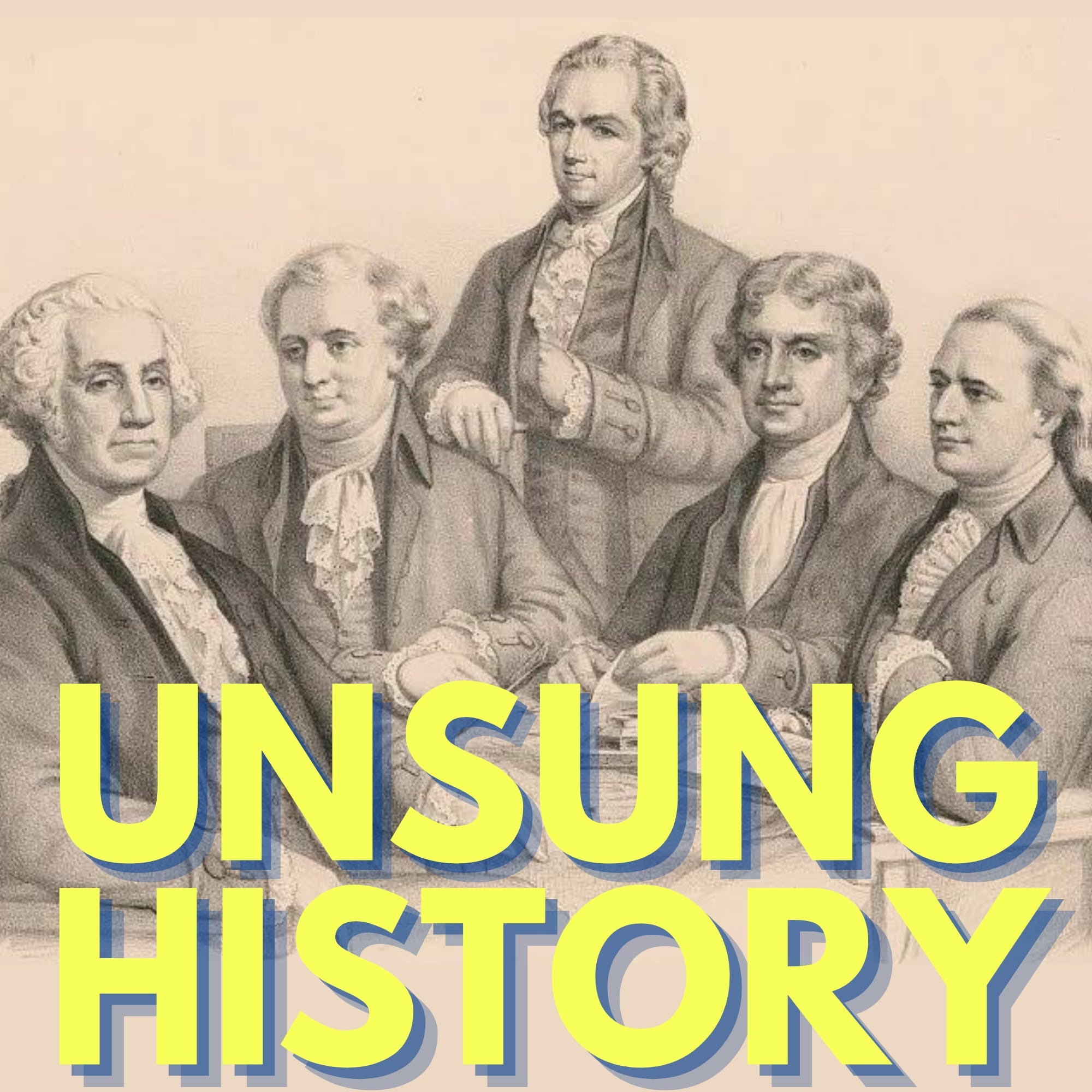
Unsung HistoryThe CabinetToday, when Americans think of it at all, they take for granted the institution of The Cabinet, the heads of the executive departments and other advisors who meet with the President around a big mahogany table in the White House. But how did The Cabinet come into being? It’s not established in the Constitution, and the writers of The Constitution were explicitly opposed to creating a private executive advisory body.I’m joined in this episode by presidential historian Dr. Lindsay M. Chervinsky, author of The Cabinet: George Washington and the Creation of an Ame...
2022-04-1845 min
The Vault PodcastUser Spotlight - How Therese Prentice uses MVLearn how Therese Prentice runs her business 'Eclectic Soul Collective' using MV. // This interview is hosted by Remi Oduyemi, from #TeamMV, and you can check out Remi's own MV site at www.onlinebusinesstemple.com // Also be sure to Check out Therese Prentice's MV account here: https://eclecticsoulcollective.vipmembervault.com
2022-04-1334 min
Unsung HistoryThe Abolition Movement of the 1830sFrom the founding of the United States, there were people who opposed slavery, but many who grappled with the concept, including slave owner Thomas Jefferson, envisioned a plan of gradual emancipation for the country. In 1817, after the establishment of the American Colonization Society, free Blacks in Philadelphia and elsewhere began to fight for immediate abolition for all enslaved people in the United States. By the 1830s, they were joined in these efforts by white allies.Although not as well known as later abolitionists like Sojourner Truth, Harriet Tubman, and Frederick Douglass, the abolitionists of...
2022-04-1141 min
Unsung HistoryThe 1913 Ascent of DenaliIn June 1913, a group of four men ascended to the peak of Denali, the first humans known to have reached the highest point in North America. In a time before ultra lightweight and high-tech equipment, Hudson Stuck, Harry Karstens, Robert Tatum, and Walter Harper had to haul heavy loads of food and supplies and books up the mountain with them, battling fire and clearing away earthquake debris along the way. After nearly two months of expedition, they finally stood atop the world.I’m joined in this episode by Patrick Dean, author of A Win...
2022-04-0442 min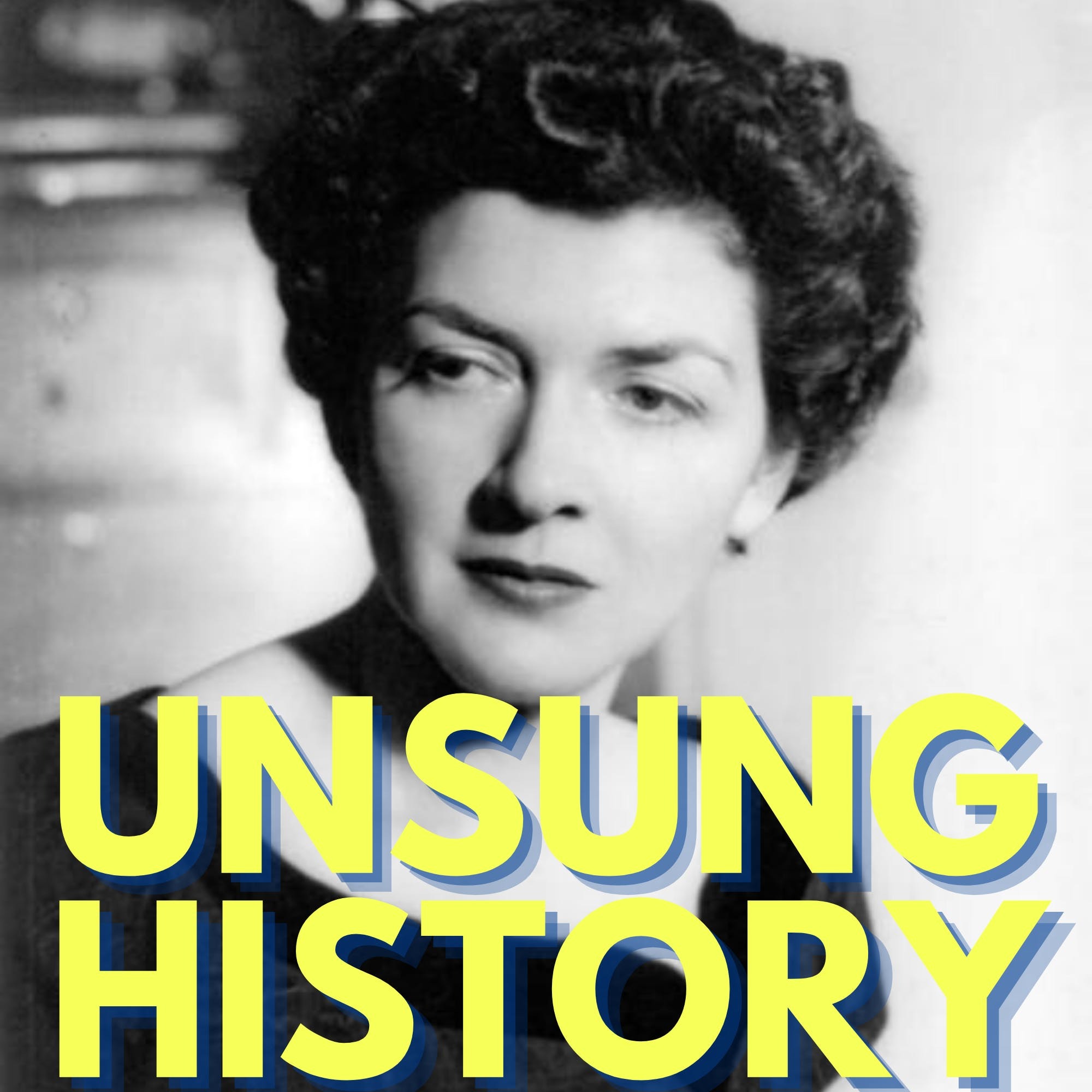
Unsung HistoryCordelia Dodson HoodWhen German troops invaded Austria in 1938, Cordelia Dodson was visiting Vienna, living with her siblings as they studied German, attended the opera, and marched with Austrian students protesting against Hitler. Even with this experience, Cordelia may have settled into academic life in the United States, but when Pearl Harbor was bombed, and the US entered the war, she felt called to serve her country.In a decades-long career in Europe, Cordelia Dodson Hood combined her linguistic skill, her phenomenal memory, and her ability to connect with people, to gather and analyze intelligence, first about...
2022-03-2844 min
Unsung HistoryThe National Women's Football LeagueIn 1967, a Cleveland talent agent named Sid Friedman decided to capitalize on the popularity of football in the rust belt by launching a women’s football league, which he envisioned as entertainment, complete with mini-skirts and tear-away jerseys. The women he recruited had other ideas, and soon they were playing competitive tackle football, not in skirts but in football uniforms. In 1974, the owners of several teams around the country, some from Friedman’s WPFL and some independent of it, formed to create their own league: the National Women’s Football League, the NWFL, which started...
2022-03-2140 min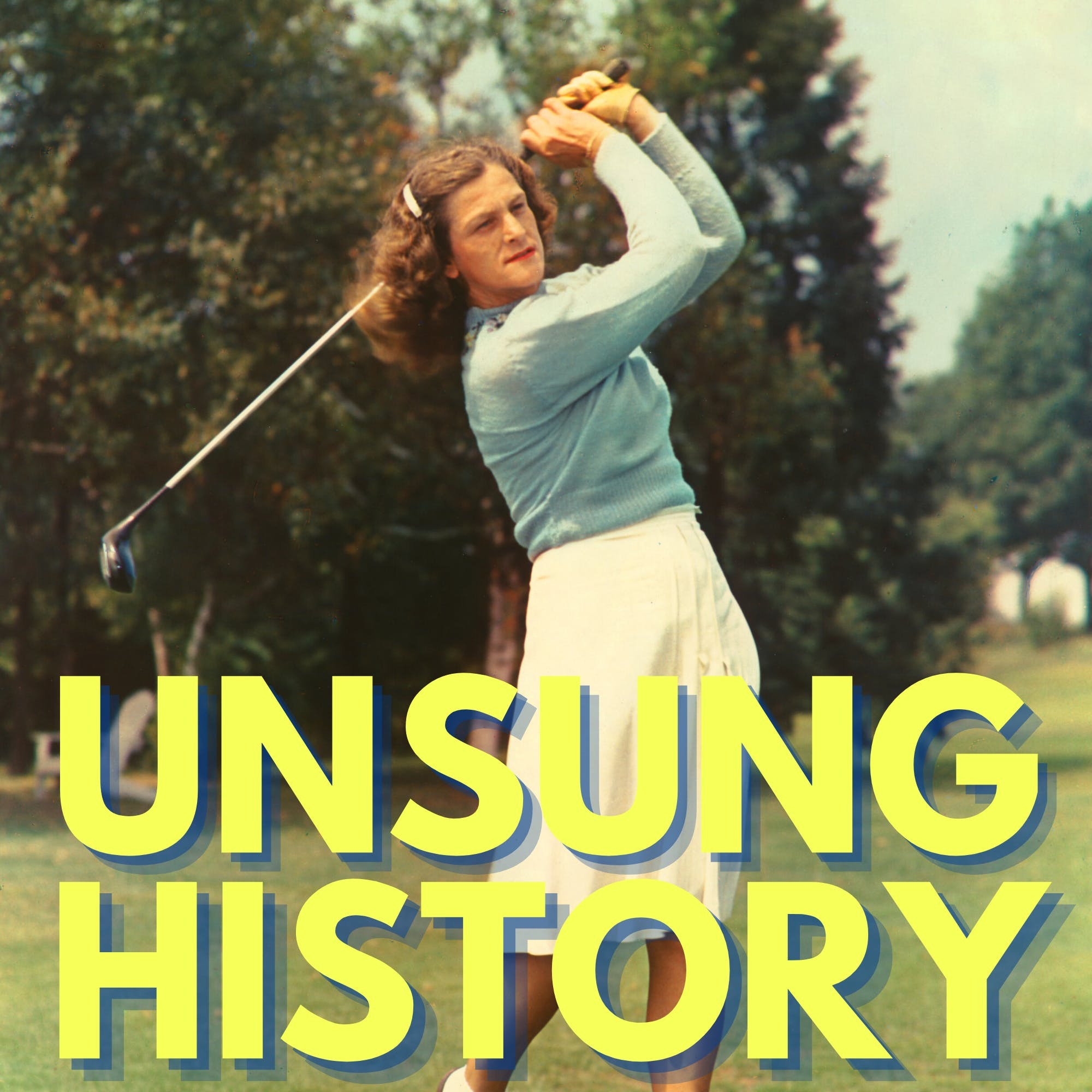
Unsung HistoryBabe Didrikson ZahariasBorn in 1911, Mildred Ella Didrikson Zaharias, who went by the nickname “Babe,” was a phenomenal, and confident athlete. Babe won Olympic gold in track and field, was an All American player in basketball, pitched in exhibition games in Major League Baseball, and won 17 straight women’s amateur golf tournaments, before turning pro and co-founding the LPGA.In a society that didn’t welcome women like Babe, she nonetheless forged her own path and won the hearts of fans along the way.I’m joined in this episode by History Professor Dr. Corye Perez Beene, author of...
2022-03-1451 min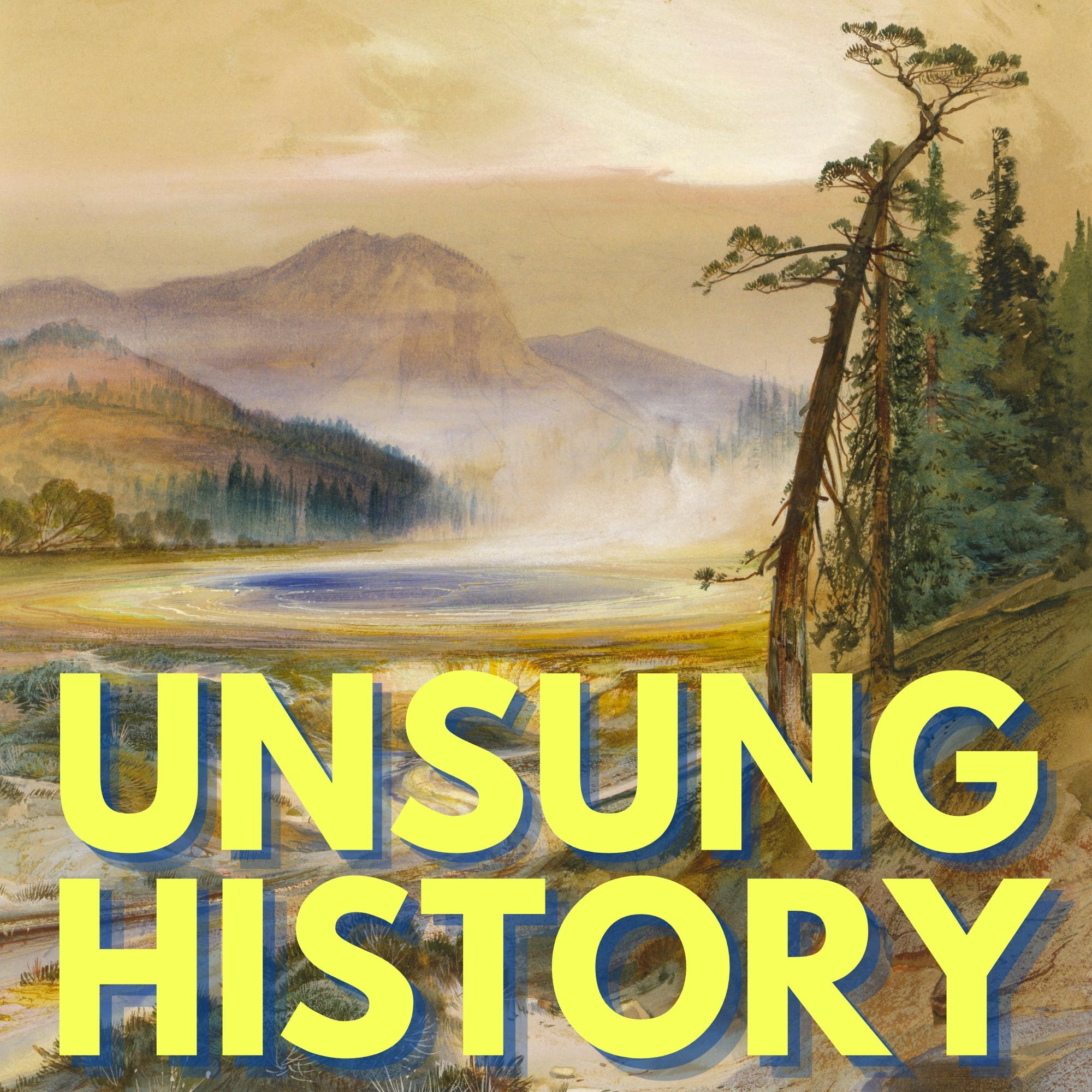
Unsung HistoryYellowstone National ParkOne hundred fifty years ago, President Ulysses S. Grant signed an act establishing Yellowstone National Park into law, making it the first national park in the United States, and a cause for celebration in a country still recovering from the devastating Civil War. Not everyone celebrated, though, including Native Americans who had called the land home for thousands of years before white trappers and explorers first experienced the wild majesty of the landscape. To learn more about the men who championed the creation of the park and the Indigenous resistance to it, I’m joi...
2022-03-0757 min
Unsung HistoryFreedpeople in Indian TerritoryWhen the Cherokee, Chickasaw, Choctaw, Muskogee (or Creek), and Seminole Nations – known as “The Five Civilized Tribes” by white settlers – were forcibly moved from their lands in the Southeastern United States to Indian Territory (present-day Oklahoma), they brought their possessions with them, including the people of African descent whom they had enslaved.After the Civil War, these slaves were freed and freedpeople were included in the allocation of Native lands undertaken by the Dawes Commission, making them the one group of former slaves to receive some reparations. However, like freedpeople in the South, their status a...
2022-02-2839 min
Unsung HistoryAlice Dunbar-NelsonNOTE: Alice Dunbar-Nelson's story includes acts of sexual violence. Listeners may wish to skip past the introduction to avoid this content. Poet, essayist, and activist Alice Dunbar-Nelson is perhaps best known as the widow of poet Paul Laurence Dunbar, but she is a remarkable figure in her own right. Born in New Orleans in 1875 to a mother who had only recently been freed from slavery and an unknown father, Alice graduated from Straight University (later Dillard University), became a teacher, and quickly started her own writing career. Throughout her l...
2022-02-2144 min
Unsung HistoryThe 6888th Central Postal Directory BattalionOn February 14, 1945, after crossing the Atlantic Ocean and surviving a run-in with a Nazi U-Boat, the women of the 6888th Central Postal Directory Battalion disembarked the Île-de-France in Glasgow, Scotland. The task awaiting the only all-Black, all-female battalion overseas during World War II was daunting. There were airplane hangars filled with a backlog of millions of pieces of mail sitting in Birmingham, England, addressed from friends and family to service members stationed across Europe. Despite segregation and poor working and living conditions, the Six Triple Eight made quick work of the postal backlog, doing their part...
2022-02-1439 min
Unsung HistoryJulia ChinnJulia Chinn was born into slavery in Kentucky at the tail end of the 18th Century. Despite laws against interracial marriage, Richard Mentor Johnson, the ninth Vice President of the United States, called Julia Chinn his wife, and he recognized their daughters together as his. Johnson left Julia in charge of his Blue Spring Farm when he was away in DC for months at a time, and Julia ran the household and plantation, managed the business affairs, and worked as both manager and nurse at the Chocktaw Academy boarding school for Native American boys on the property. When the...
2022-02-0753 min
Unsung HistoryWho was Carol Lane?In fall 1947 the Shell Oil Company hired a Women’s Travel Director named Carol Lane, who served in the role until she retired in 1974. Lane’s job was to encourage women to travel, showing them the joys of touring the country by car. Lane herself traveled around the United States and Canada, speaking to women’s clubs and on radio and TV, giving travel tips and packing demonstrations. Eventually, she even awarded women who developed local travel safety programs with the Carol Lane Award.So who was Carol Lane? To learn the answer to that q...
2022-01-3148 min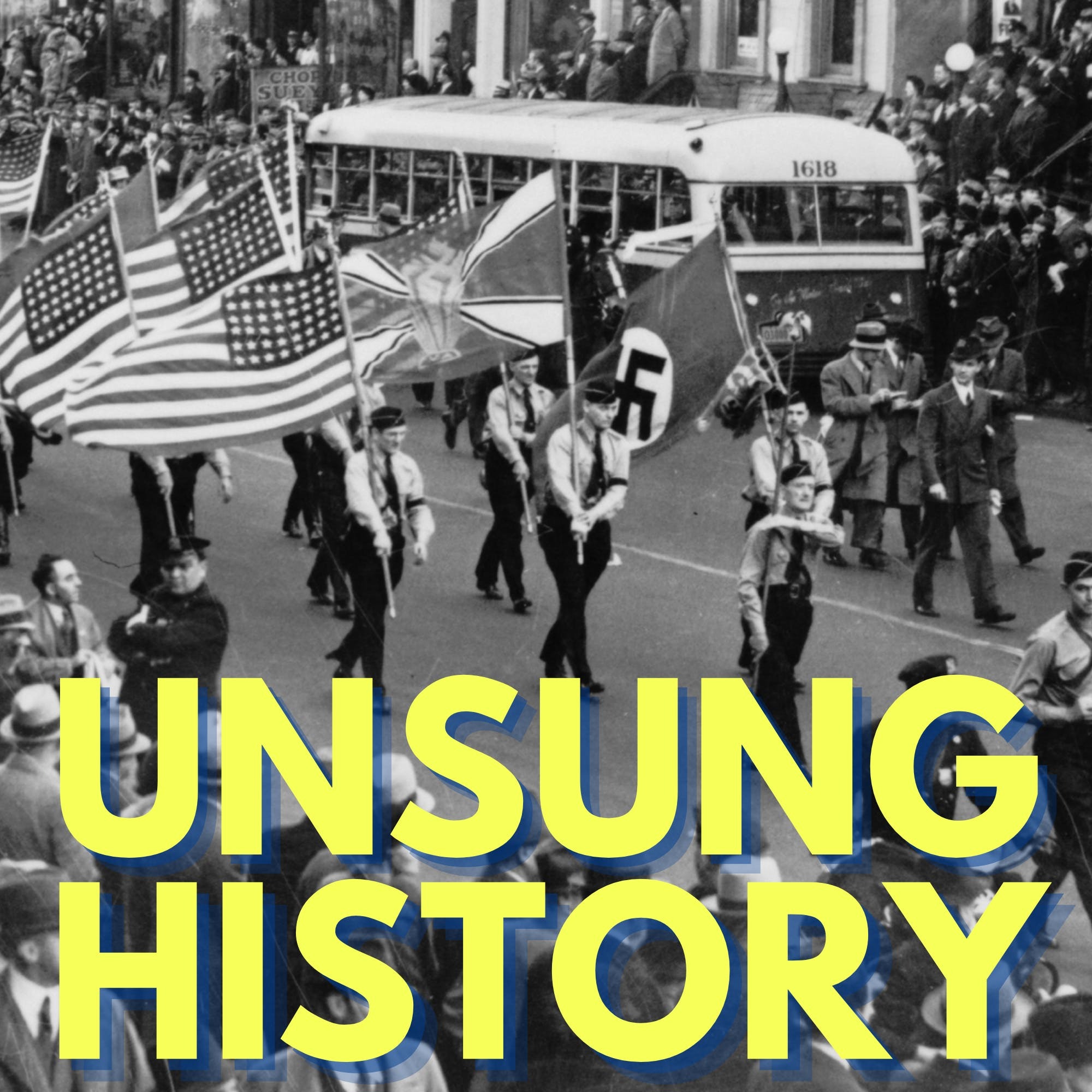
Unsung HistoryThe Amerikadeutscher Volksbund & the Newark Minutemen in the 1930sThe rise of Nazism before World War II wasn’t limited to Germany. The German-Americna Bund (Amerikadeutscher Volksbund) formed in Buffalo, New York, in 1936, to promote a favorable view of Nazi Germany. It quickly grew to 70 local groups around the country, with 20 training camps where kids aged 8-18 practiced military drills and wore Nazi-style uniforms. By 1939, 20,000 people attended the Bund’s Pro American Rally in Madison Square Garden.When Prohibition ended in 1933, Jewish American gangsters who had been running liquor businesses suddenly had more time on their hands, and they decided to fight back agai...
2022-01-2446 min
Unsung HistoryMary Ann Shadd CaryMary Ann Shadd Cary, born in Delaware in 1823, was a teacher, a writer, an abolitionist, a suffragist, and a lawyer, and is considered to be the first Black woman to publish and edit a newspaper in North America, The Provincial Freeman. When abolitionist Frederick Douglass asked readers of his newspaper in 1848 for suggestions on how to improve life for African Americans, Shadd Cary answered: “We should do more and talk less,” and she spent her life following that motto in both the United States and in Canada, despite the challenges she faced both as an African American and as a wom...
2022-01-1740 min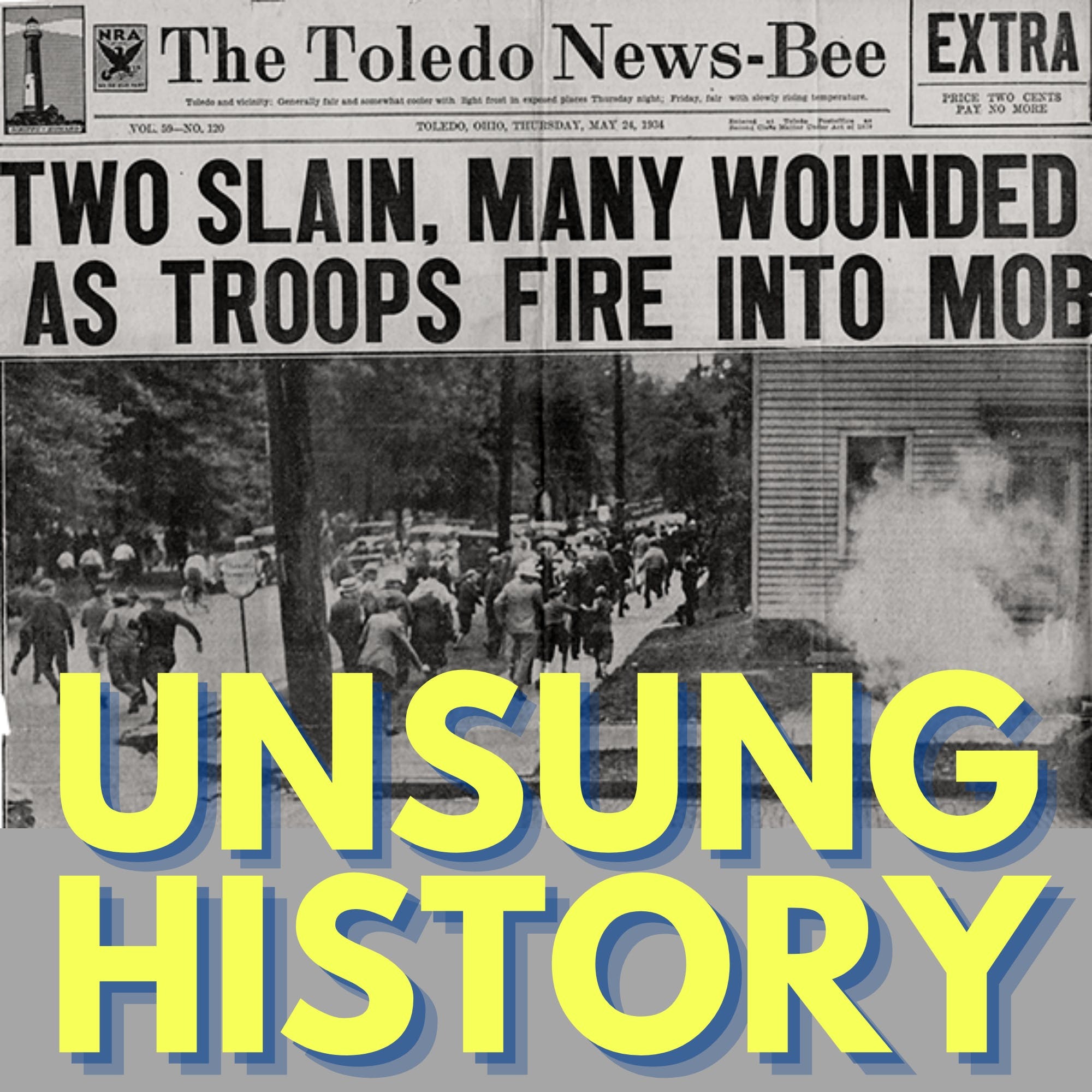
Unsung HistoryThe 1934 Toledo Auto-Lite StrikeIn February, 1934, in the midst of the Great Depression, a small group of unionized workers at the Electric Auto-Lite company of Toledo, Ohio, went on strike. When management failed to sign a promised contract by the April 1 deadline, more workers went on strike. And this time they had help from the Unemployed League. What started as a small walkout turned into a massive demonstration by 10,000 strikers, and a battle with the Ohio National Guard, and is now regarded as one of the most important strikes in U.S. history.Joining me on this episode...
2022-01-1057 min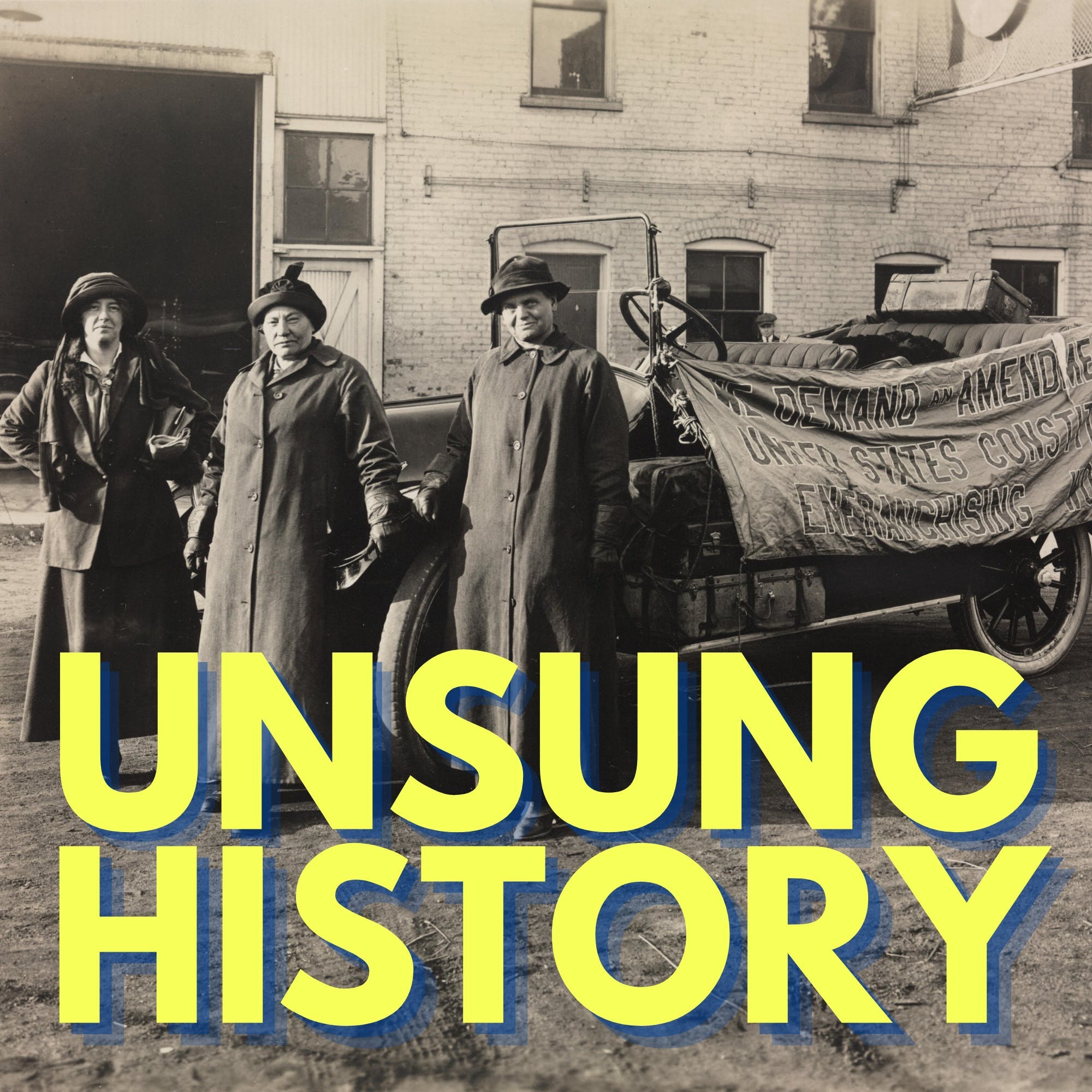
Unsung HistoryThe Suffrage Road Trip of 1915In September 1915, four suffragists set off from the Panama–Pacific International Exposition in San Francisco, California, in a brand-new Overland 6 convertible to make the 3,000-mile drive across the country to deliver a petition for women’s suffrage to President Woodrow Wilson on the opening day of Congress in December. Along the way they faced illness, terrible driving conditions, and opposition to women’s suffrage. Joining me to help us learn more about the road trip, and especially the unsung Swedish immigrant heroines, driver Maria Kindberg and mechanic Ingeborg Kindstedt, is historian and activist, Anne Gass, au...
2022-01-0336 min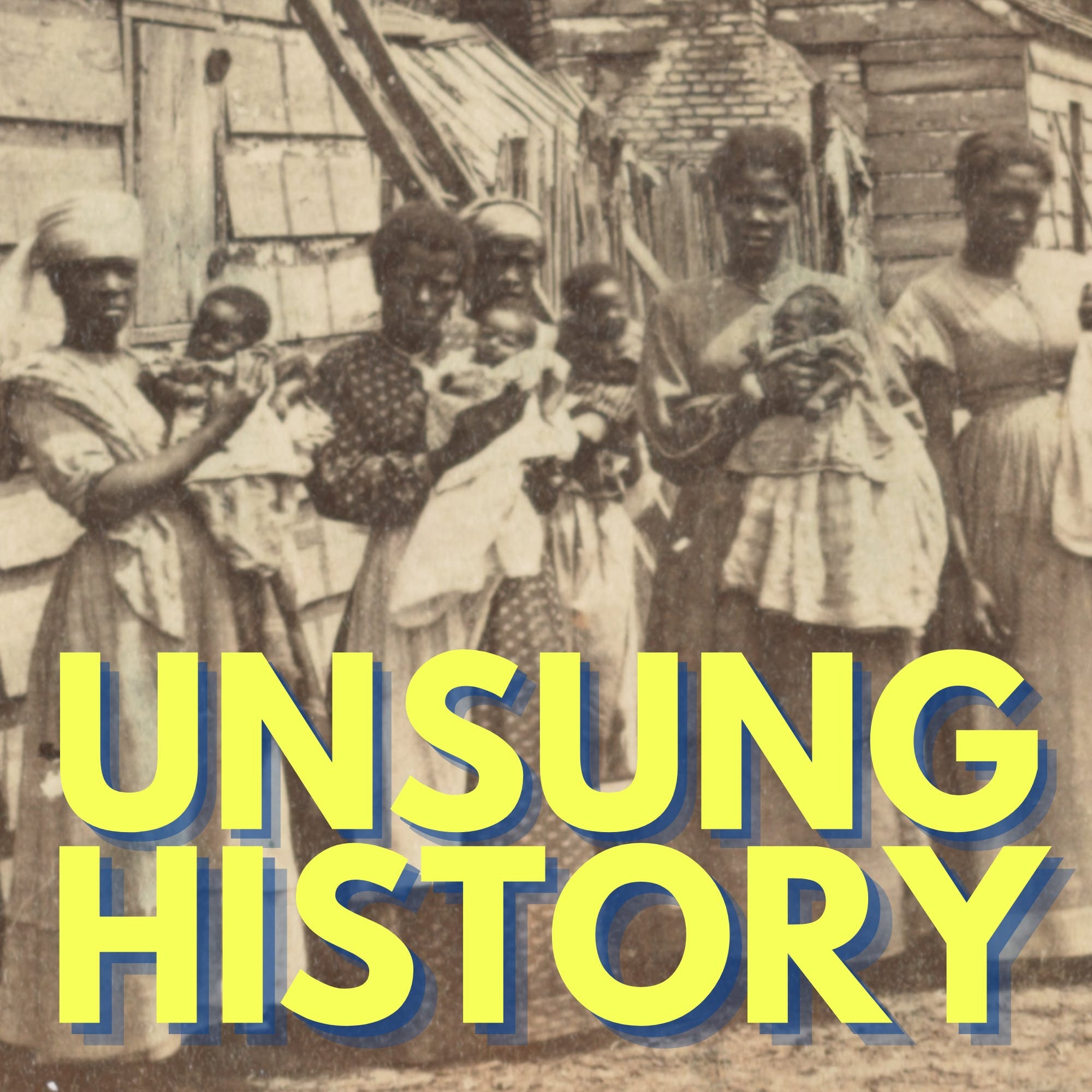
Unsung HistoryWomen-Led Slave RevoltsEnslaved Africans in what is now New York State and in the Middle Passage resisted their enslavement, despite the risk of doing so. In the previously accepted history of these slave revolts, the assumption was that men led the resistance, but Dr. Rebecca Hall dug deeper into the records and read against the grain to find the women warriors who fought for their freedom.Joining me to help us learn more is Dr. Rebecca Hall, a scholar, activist and educator, who writes and speaks on the history of race, gender, law and resistance, and a...
2021-12-2744 min
Unsung HistoryThe Women Airforce Service Pilots of World War IIFrom September 1942 to December 1944, over 1000 American women served in the war effort as Women Airforce Service Pilots (WASP), flying 80% of all ferrying missions and delivering 12,652 aircraft of 78 types. They also transported cargo, test flew planes, demoed aircraft that the male pilots were scared to fly, simulated missions, and towed targets for live anti-aircraft artillery practice. The WASP did not fly in combat missions, but their work was dangerous, and 38 were killed in accidents. Even with the enormous contributions they made in World War II, the WASP weren’t recognized as part of the military until decades later when they we...
2021-12-2039 min
Unsung HistoryMabel Ping-Hua LeeMabel Ping-Hua Lee was born in China in 1896 but lived most of her life in the United States, where, due to the Chinese Exclusion Act, she had no path to naturalization until the law changed in 1943. Even though it would not benefit her for decades, Mabel Lee worked for women’s suffrage, leading the New York City Suffrage Parade on horseback at the age of only 16. Lee was the first Chinese woman to earn a PhD in Economics in the United States, graduating from Columbia University in 1921 with a dissertation entitled: “The Economic History of China: With Special Reference to Agr...
2021-12-1346 min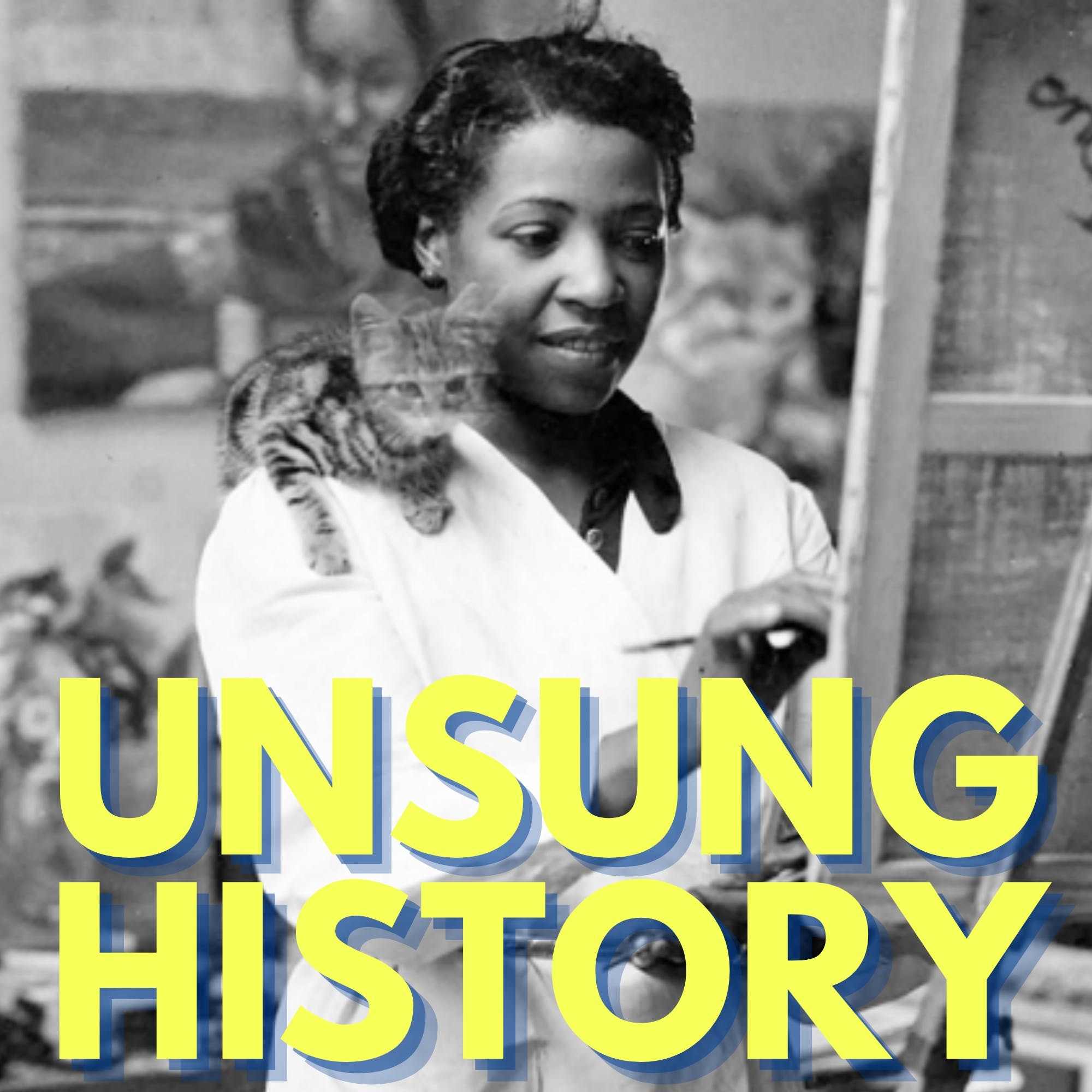
Unsung HistoryLoïs Mailou JonesBorn in Boston, Massachusetts, in 1905, artist Loïs Mailou Jones’s career spanned much of the 20th Century as both a painter and a teacher of generations of Black artists at Howard University.Jones faced racial discrimination in the US throughout much of her long life, and found refuge and inspiration in the Harlem Renaissance Movement and in the expatriate community of Black artists in Paris. Her 1953 marriage to Haitian artist Louis Vergniaud Pierre-Noel, and later research trips to Africa further influenced her work.Her many important paintings include The...
2021-12-0632 min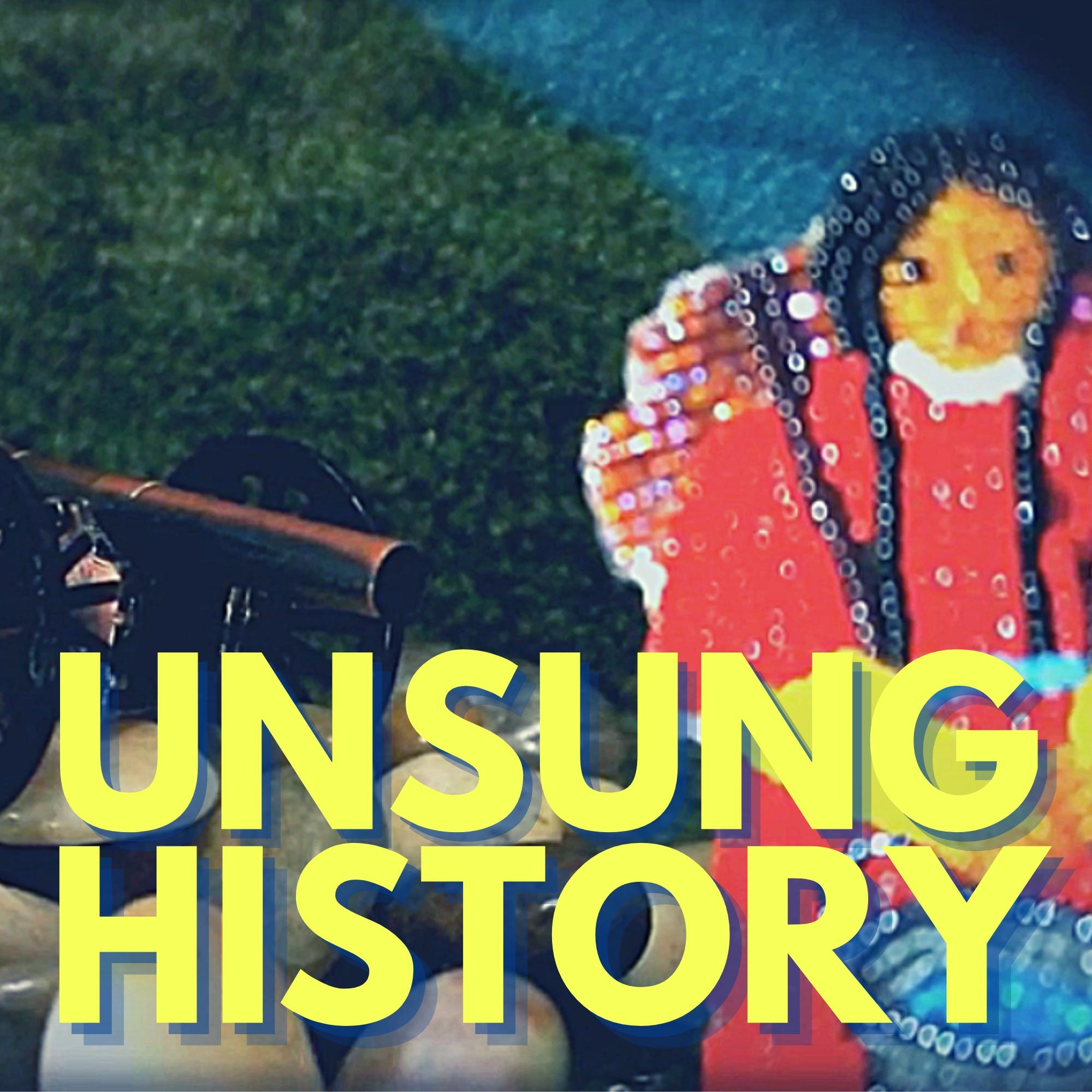
Unsung HistoryThe Yakama Warn October 1805, the Yakama encountered the Lewis and Clark Expedition near the confluence of the Yakima and Columbia rivers. By fifty years later, so many European and American trappers, traders, and eventually, settlers, had arrived in the area, putting demands on the land and resources, that federal government officials called a council meeting with the local tribal nations to negotiate a treaty by which the native people would move on to reservations in exchange for federal benefits. The tribal nations, including the Yakama, signed the treaty--reluctantly--in June 1855, but it had to be ratified by t...
2021-11-2936 min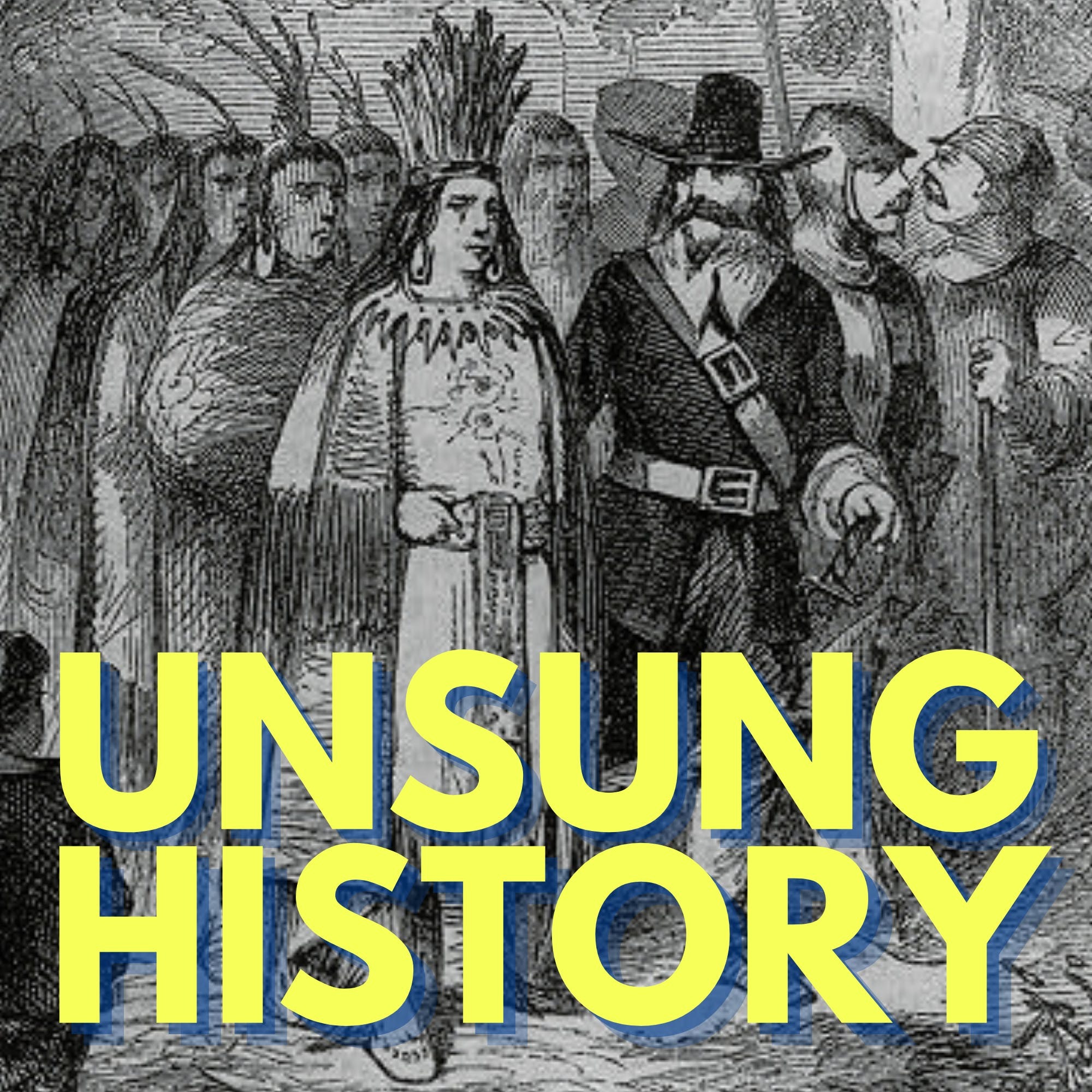
Unsung HistoryThe Wampanoag & the Thanksgiving MythIn Autumn of 1621, a group of Pilgrims from the Mayflower voyage and Wampanoag men, led by their sachem Massasoit, ate a feast together. The existence of that meal, which held little importance to either the Pilgrims or the Wampanoag, is the basis of the Thanksgiving myth. The myth, re-told in school Thanksgiving pageants and TV shows, is not accurate and is harmful to Native people, especially to the Wampanoag. In 1970, the Commonwealth of Massachusetts planned a banquet to celebrate the 350th anniversary of the landing of the Pilgrims. They asked an Aquinnah Wampanoag man, F...
2021-11-2235 min
Unsung HistoryTreaty Rights of the Red Cliff Band of Lake Superior OjibweBefore the arrival of Europeans, the Ojibwe nation occupied much of the Lake Superior region, including what is now Ontario in Canada and Michigan, Wisconsin, and Minnesota in the United States. In 1850, President Zachary Taylor’s administration, in response to demands from European Americans, planned to force the Ojibwe of Wisconsin west of the Mississippi in violation of signed treaties.They planned to bring the Ojibwe to Minnesota from Wisconsin in late fall so that they would have to stay for the winter, wearing down their resistance to relocation. Nearly 3000 Ojibwe men made the lo...
2021-11-1541 min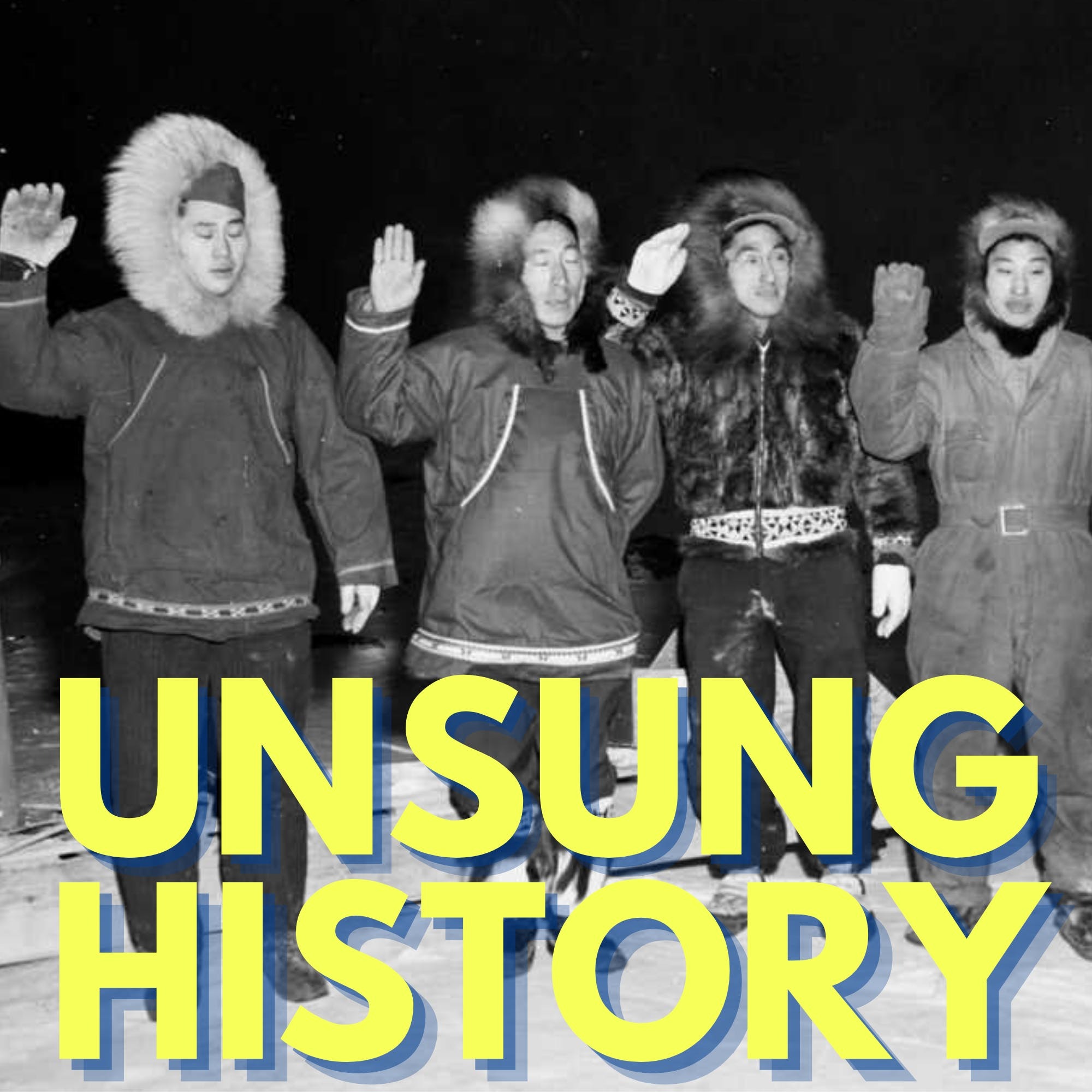
Unsung HistoryAlaska Territorial Guard in World War IIPrior to World War II, most of the US military deemed the territory of Alaska as militarily unimportant, to the point where the Alaska National Guard units were stationed instead in Washington state in August of 1941. That changed when the Japanese invaded and occupied two Alaskan islands in June of 1942. The US government responded first by evacuating Unangax̂ villagers and forcibly interning them in Southeast Alaska in facilities without plumbing or electricity for two years where many died of disease.To protect the Alaskan territory from further invasion, Major Ma...
2021-11-0839 min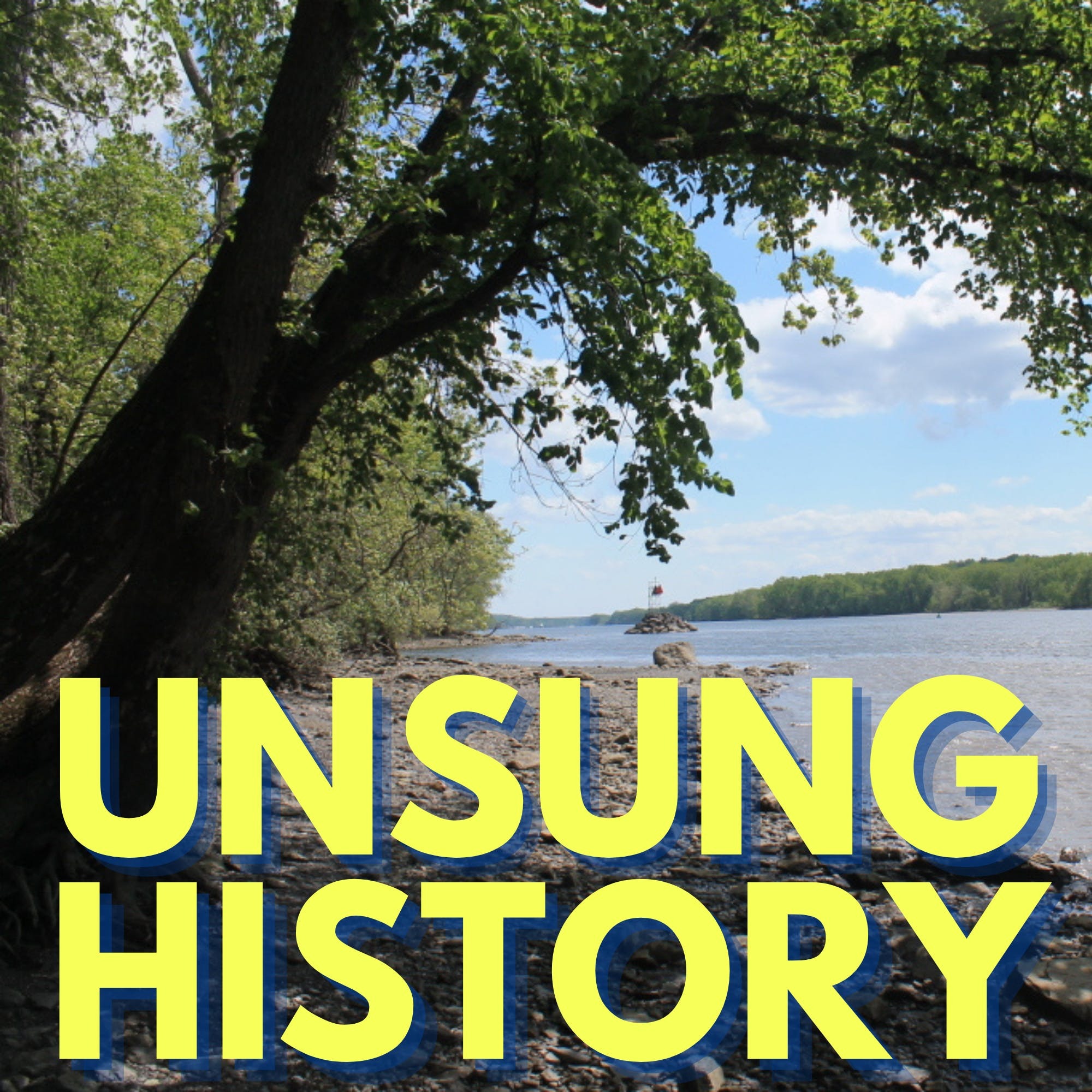
Unsung HistoryThe Stockbridge-Munsee Community & their Removal HistoryThe Stockbridge-Munsee Community, the People of the Waters that Are Never Still, were forced to move many times after they first encountered Europeans.In 1609, Dutch trader Henry Hudson sailed up the Mahicannituck, the River that Flows Both Ways, into Mohican land. By 1614 there was a Dutch trading post established on a nearby island to take advantage of the beaver and otter availability. The arrival of the Europeans changed the economic pattern of the Mohicans, and brought both disease and religion into their land.The Mohican people, part of the...
2021-11-0143 min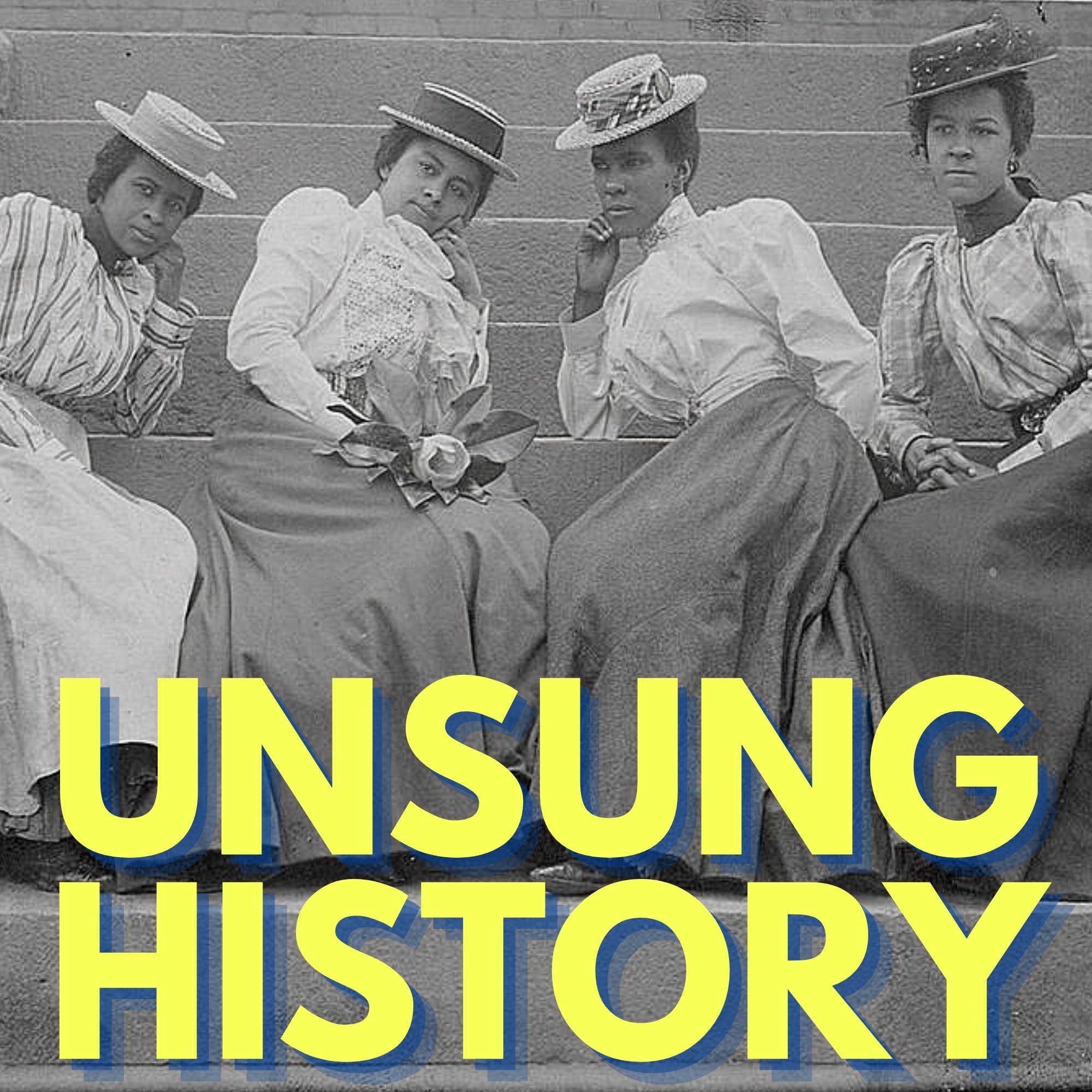
Unsung HistoryFashion, Feminism, and the New Woman of the late 19th CenturyThe late 19th Century ushered in an evolution in women’s fashion from the Victorian “True Woman” whose femininity was displayed in wide skirts and petticoats, the “New Woman” of the late 19th and early 20th centuries was modern and youthful in a shirtwaist and bell-shaped skirt.Earlier fashion experimentation by feminists in the mid-19th Century had failed to catch on and had interfered with their ability to inspire change as they were labeled radical for their sartorial choices. Feminists in the late 19th Century chose a different path, using the popular fashions of the day...
2021-10-2539 min
Friends in Your EarsErin Milanese and Kelly Therese PollockJoin political junkies and the bachelor connoisseurs Erin Milanese, Kelly Therese Pollock and Kathy Campbell as we see how deep the rabbit hole is, and prepare to be left contemplating the meaning of life on a special FIYE bonus question.
Theme Music by Christopher and Adelaide Breen
Edited by Dear Podcast
Incomparable Memberships!: Sign up, help support this show, and get some fun bonus material.
Kathy Campbell with Erin Milanese and Kelly Therese Pollock
Show Notes & Links
Tell Me About Yourself
Erin Milanese
2021-10-2225 min
Unsung HistoryThe Original Fight for the Equal Rights AmendmentAfter the 19th Amendment was ratified in 1920, enfranchising (some) women, lots of questions remained. If women could vote, could they serve on juries? Could they hold public office? What about the array of state-laws that still privileged husbands and fathers over wives and daughters in regard to property and earnings rights? In February 1921, Alice Paul, head of the National Woman’s Party declared: “Now that political freedom has been won, we hope to wipe out sex discrimination in law, so that the legal status of women will be self-respecting.” Their strategy to accomplish this, on the...
2021-10-1841 min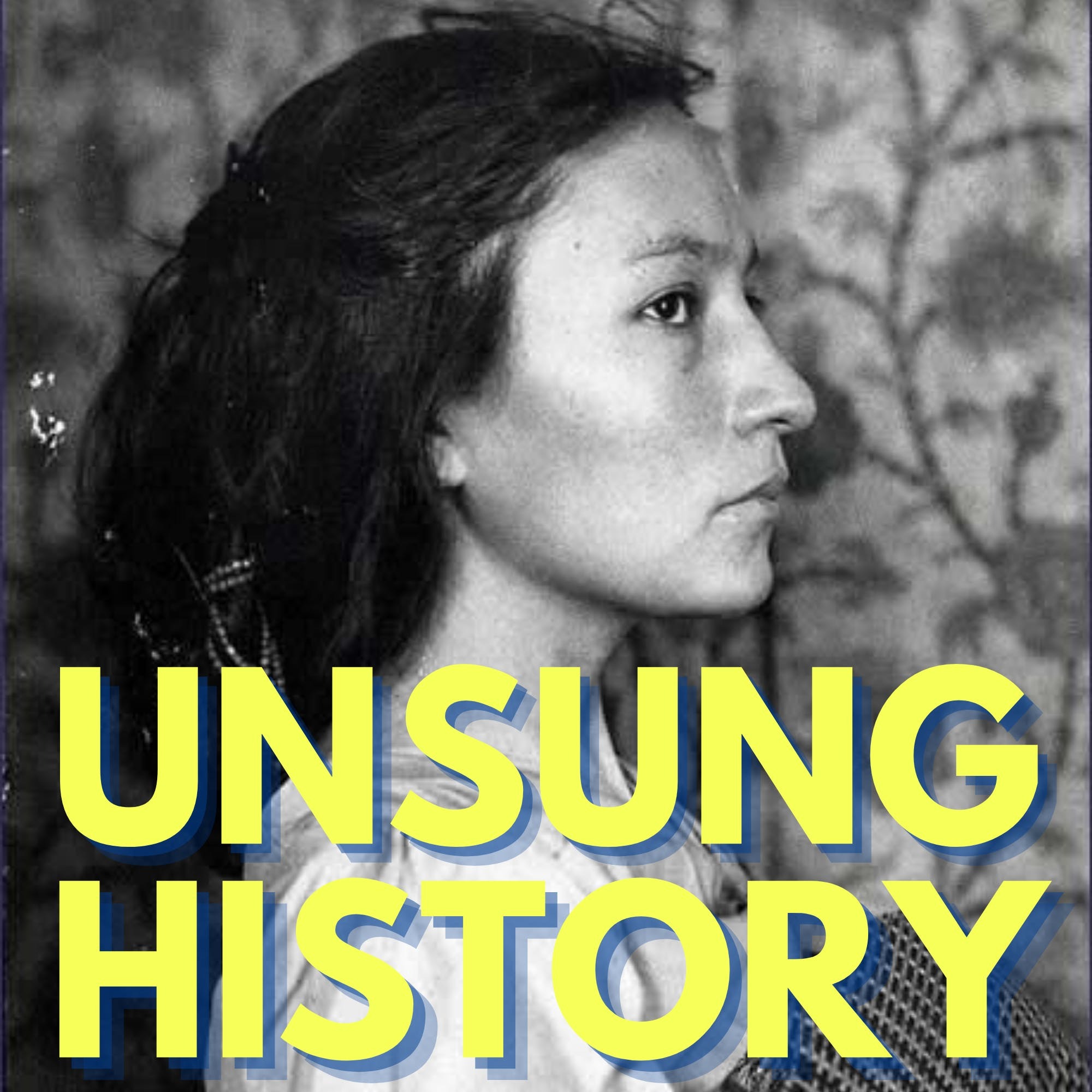
Unsung HistoryZitkála-ŠáWriter, musician, and political activist Zitkála-Šá, also known as Gertrude Simmons Bonnin, was born on February 22, 1876, on the Yankton Indian Reservation in South Dakota, where she lived until she was eight.When Zitkála-Šá was eight years old, missionaries came to the reservation to recruit children to go to White's Indiana Manual Labor Institute. Despite her mother’s pleading, Zitkála-Šá begged to go to the school with her older brother. She later wrote that she regretted the decision almost immediately, but after three years in the boarding school she no longer felt at home on t...
2021-10-1133 min
Unsung HistoryWomen in the U.S. Military during the Cold WarNearly 350,000 American women served in the US military during World War II. Although the women in the military didn’t engage in combat their presence was vital to the American effort, in clerical work as well as in driving trucks, operating radios and telephones, repairing and flying planes, and of course, in nursing.Women’s active duty was a temporary wartime measure, but when the war ended, Secretary of Defense James Forrestal, Dwight D. Eisenhower, and General Omar Bradley, among others, argued for the continued presence of women in the military. Rep. Margaret Chase Smit...
2021-10-0439 min
Unsung HistoryFreedom Suits in Maryland & DC, 1790-1864Slavery was legal in Maryland until November 1, 1864, when a new state constitution prohibited the practice of slavery. Lincoln’s Emancipation Proclamation the year before had declared slaves in the Confederate states to be free, but Maryland was in the union and not included in the proclamation. From the late 18th Century until the Civil War, enslaved families in Prince George’s County, Maryland, brought over a thousand legal suits against hundreds of slaveholding families, arguing for their freedom.In these freedom suits, enslaved individuals sued for their freedom based on issues of breach of cont...
2021-09-2742 min
Unsung HistoryChef Lena RichardOver a decade before Julia Child’s The French Chef appeared on TV, a Black woman chef hosted her own, very popular cooking show on WDSU-TV in New Orleans. At a time when families were just beginning to own televisions, Chef Lena Richard’s show was so popular that it aired twice a week.Richard started working as a cook as a teenager for the wealthy Vairin family who employed her mom as a domestic servant. When their cook left, Alice Vairin gave Richard a trial run as cook and was so impressed that she hi...
2021-09-2042 min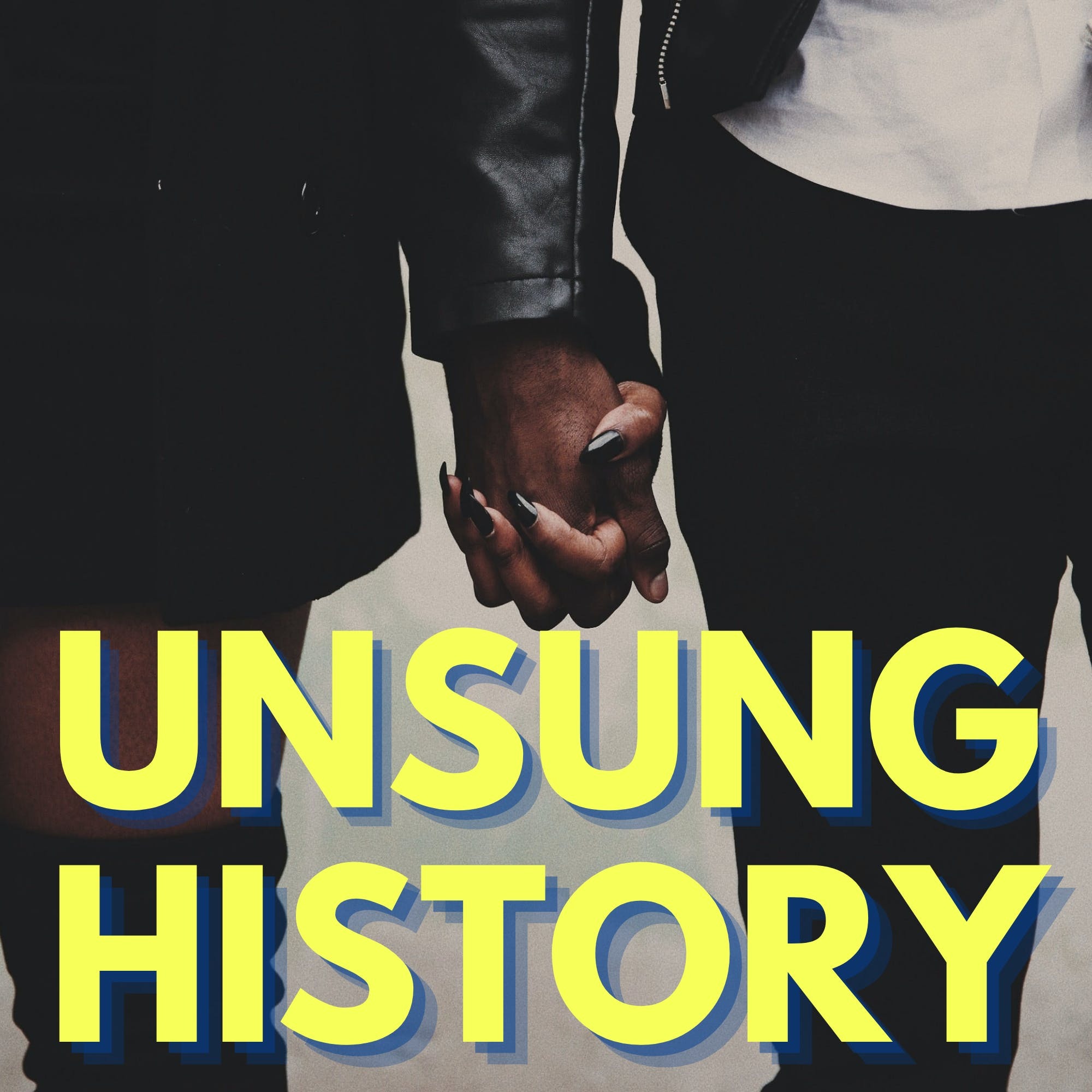
Unsung HistoryAfrican American AIDS ActivismAccording to the Centers for Disease Control and Prevention (the CDC), in 2018, 13% of the US population was Black and African American, but 42% of new HIV diagnoses in the US were from Black and African American people. This discrepancy is not new. On June 5, 1981, the CDC first published an article in its Morbidity and Mortality Weekly Report (MMWR) titled “Pneumocystis Pneumonia” that suggested that there might be “a cellular-immune dysfunction related to a common exposure that predisposes individuals to opportunistic infections such as pneumocystosis and candidiasis” to explain a number of infections they were seeing among gay...
2021-09-1344 min
Unsung HistoryThe Coors BoycottIn the mid-1960s, to protest discriminatory hiring practices, Chicano groups in Colorado called for a boycott of the Coors Brewing Company, launching what would become a decades-long boycott that brought together a coalition of activists that would include not just Chicano and Latino groups, but also African American groups, union organizers, LGBT activists, students, environmentalists and feminists.These groups had a variety of motivations for their involvement in the boycott and varied success in achieving their goals. Although the formal boycott ended by the late 1980s, some activists continue to boycott Coors beer...
2021-09-0643 min
Unsung HistoryPhrenology & Crime in 19th Century AmericaIn Nineteenth Century America there was a strong reformist push to know and improve the self. One key tactic Americans used to learn more about themselves was phrenological readings. They would pay practical phrenologists, like Orson Squire Fowler and his younger brother, Lorenzo Niles Fowler for readings of their skulls or their children’s skulls. In Lorenzo Fowler’s reading of Emily Sawyer, he concluded a thirteen-page analysis by saying: “Cultivate as much as you can the organs marked smallest in your Chart + properly guide and exercise the stronger ones + thus produce a harmony of ment...
2021-08-3043 min
Unsung HistoryChesapeake Bay Pirates & the 19th Century Oyster WarsIn Chesapeake Bay in the late 19th century, oyster harvesting was a big business. There were so many oyster harvesters harvesting so many oysters that the legislatures of Maryland and Virginia had to start regulating who could harvest oysters and how they could do so. Creating the regulations was the easy part; enforcing them was much harder. The illegal harvesting of oysters by oyster pirates continued, even after the creation of the Maryland State Oyster Police Force in 1868 and a similar force in Virginia in 1884. The first of the Oyster Wars was in Virginia i...
2021-08-2333 min
Unsung HistoryProhibition in the 1850sPopular depictions of prohibition in the United States usually show the speakeasies, bootleggers, flappers, and bathtub gin of the Roaring Twenties, but earlier attempts at prohibition stretch back far into the 19th century.In 1851, Maine passed the first statewide prohibition law, and 12 other states quickly followed as temperance societies preached the evils of alcohol. Anti-prohibitionists, especially liquor dealers and hotel owners, decried the “tyranny of the majority” and fought back with their own PR campaigns and legal challenges.Many of the methods that the anti-prohibitionists used and that were used...
2021-08-1639 min
Unsung HistoryThe Nativist Riots of Philadelphia in 1844In May of 1844, growing tensions between nativists and Irish Catholic immigrants in Philadelphia erupted into violence in the streets of the Irish Catholic Kensington district, prompted in part by a disagreement over whether the King James Bible should be read in public schools.A citizen posse called by county sheriff Morton McMichael was unable to quell the violence, and the local state militia, under the command of General George Cadwalader stepped in to help, as homes and churches were destroyed, $150,000 in damages (equivalent to over $4 million today). Fourteen people were killed and as many...
2021-08-0941 min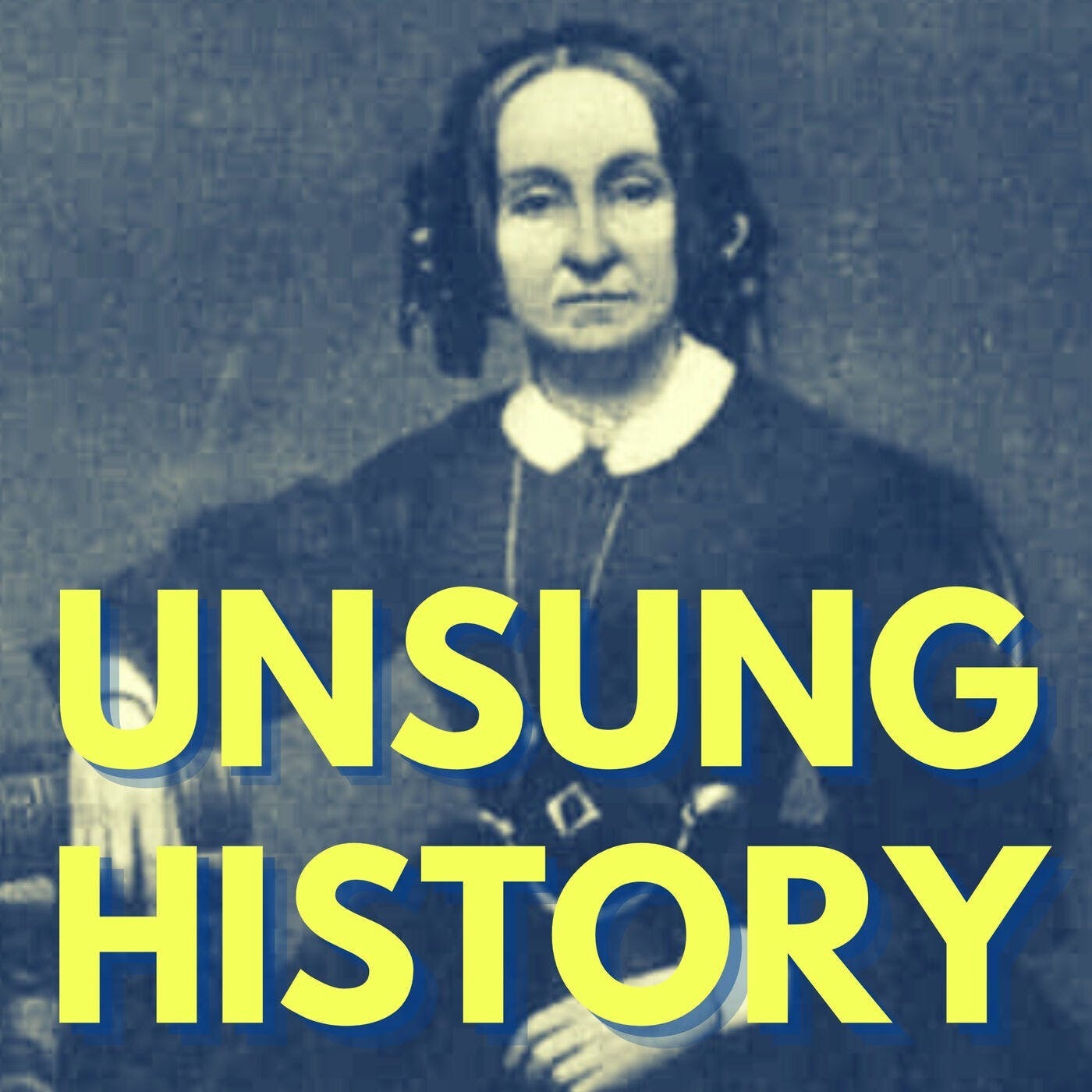
Unsung HistoryElizabeth PackardElizabeth Packard was born in Massachusetts in 1816 into a comfortable home where her parents were able to provide for her education. She taught briefly at a girls’ school before at age 23 agreeing at her parents’ urging to marry 37-year-old Calvinist minister Theophilus Packard. Over the next 20 years Elizabeth was a devoted mother and housewife who grew the family’s vegetables and sewed clothes for their six children.To the outside world, it appeared to be a contented marriage, until Elizabeth started to publicly express her religious beliefs, which were at odds with her husband’s. Theop...
2021-08-0235 min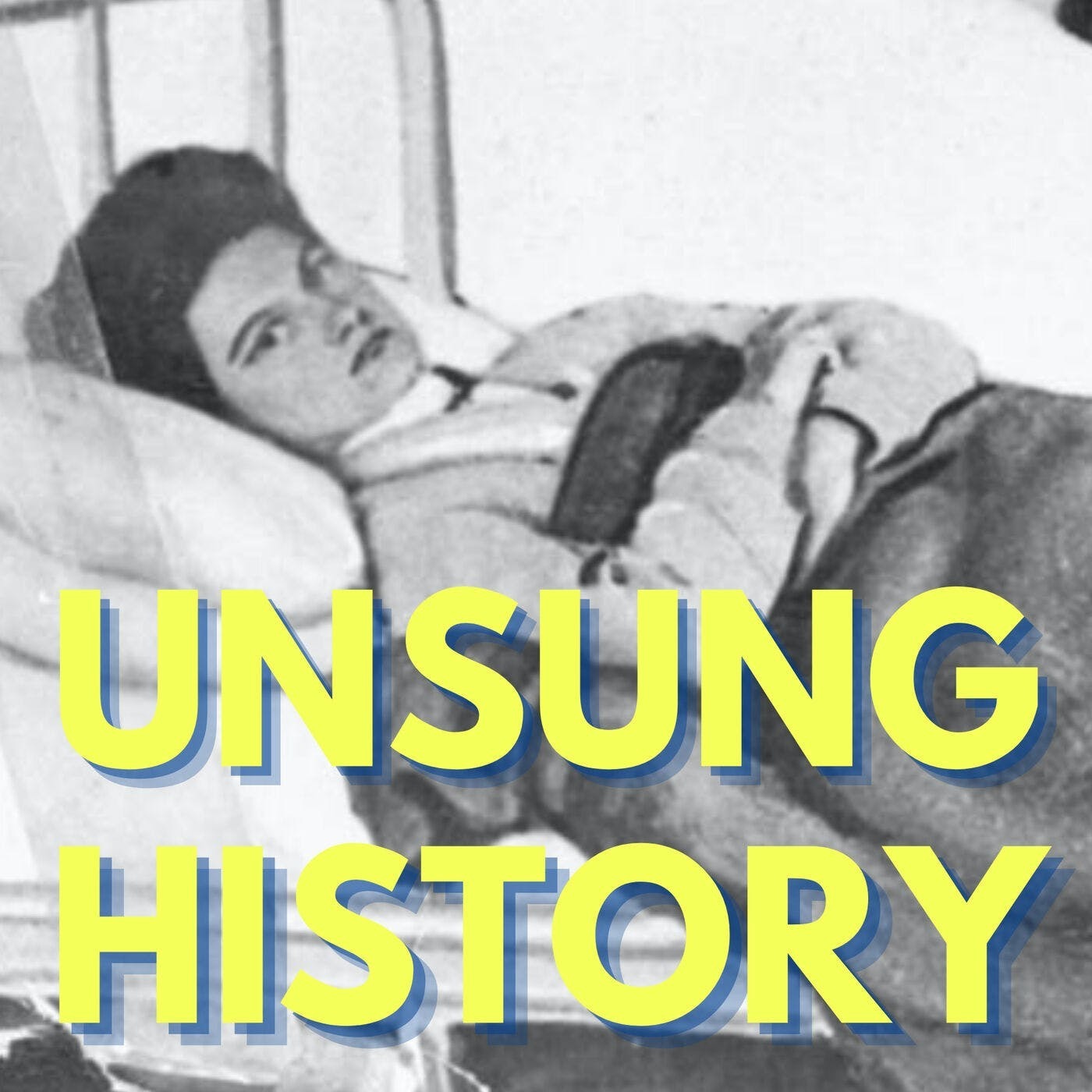
Unsung HistoryMary Mallon (The Sad & Complicated Story of "Typhoid Mary")Mary Mallon, known to history as Typhoid Mary, immigrated from Northern Ireland to New York City at age 15, around 1883. She found work as a cook, a well paying job for an immigrant woman and worked for number of different families in the early 20th Century.In March 1907, civil engineer George Soper burst into the kitchen of the home where she was cooking and told her that she was spreading typhoid via her cooking. He demanded samples of her feces, urine, and blood to test. Mallon, who believed she was in perfect health, chased him...
2021-07-2644 min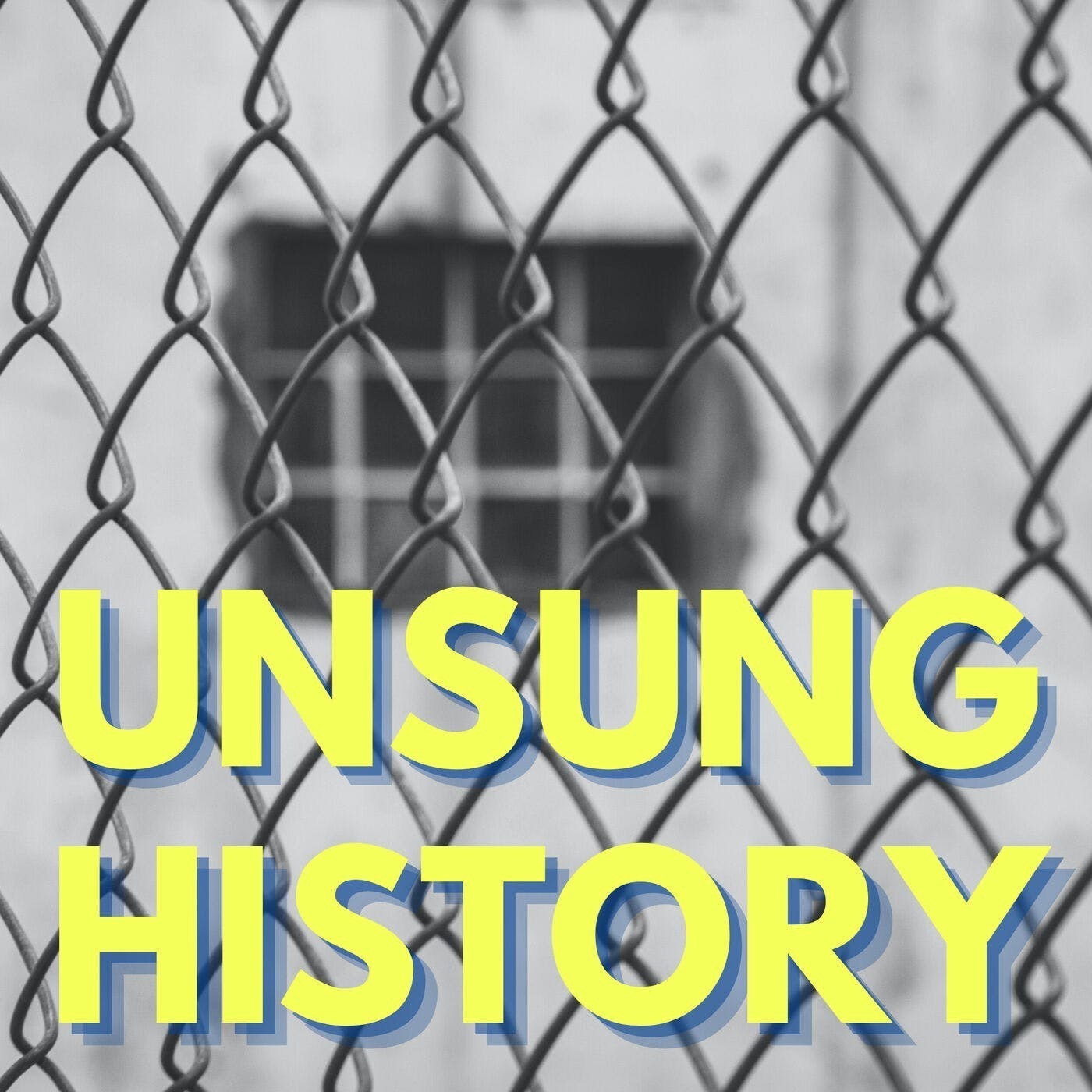
Unsung HistoryThe El Centro Hunger Strike of 1985In 1945, United States immigration officials opened the El Centro Immigration Detention Camp in El Centro, California, to be an administrative holding center for unauthorized Mexican migrants, many of whom had been working on local farms and ranches. From the beginning, migrants were often detained for long periods of time while they served as the unpaid labor force of the center.Conditions were poor in the facility in the decades that followed, and in 1985 the incarcerated migrants (by this time a multinational group) decided to strike. On May 27, 1985, fifteen detained men stormed the mess hall...
2021-07-1934 min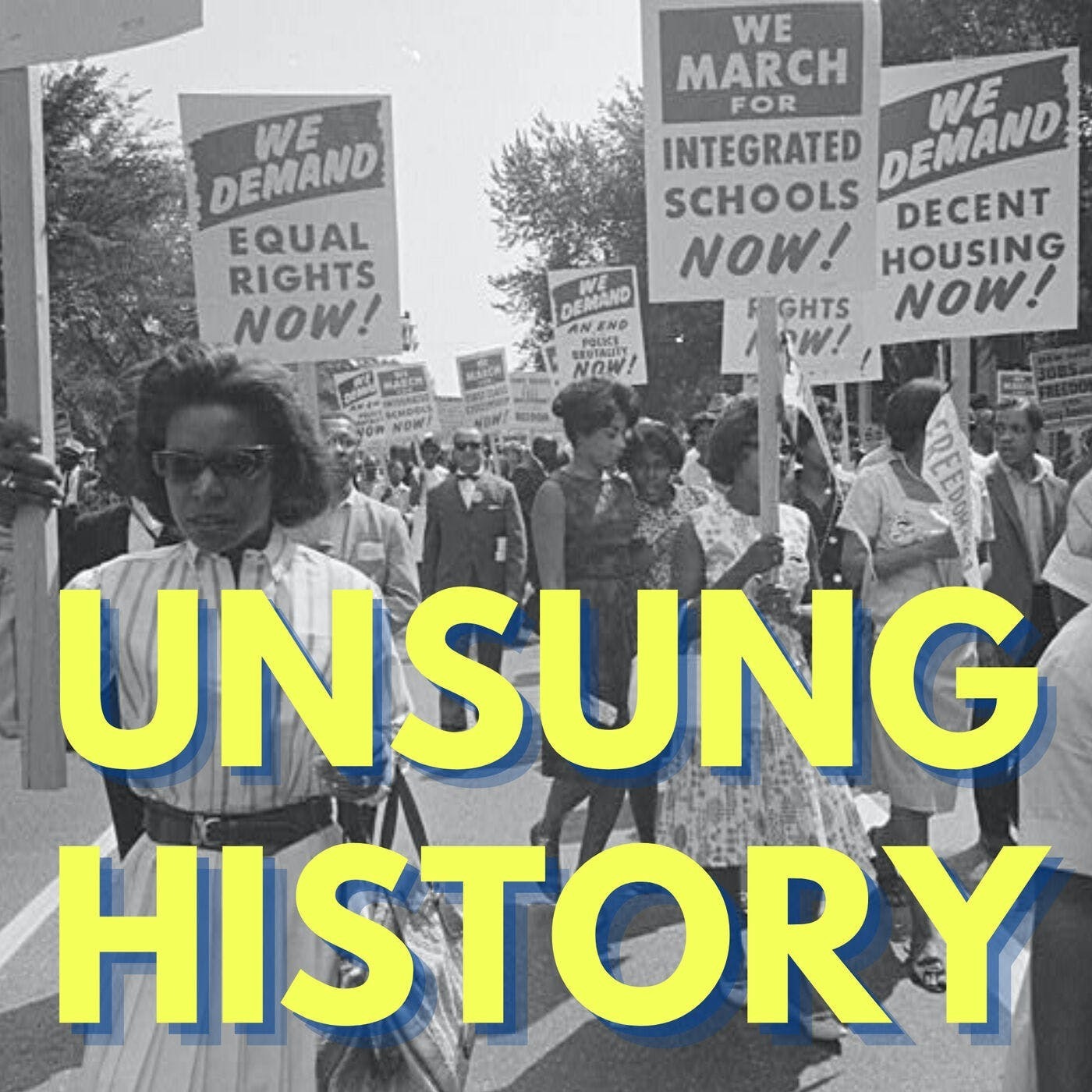
Unsung HistoryBlack Teachers & The Civil Rights Movement in South CarolinaOn May 17, 1954, the Supreme Court decided unanimously in Brown v. Board of Education of Topeka Kansas that that racial segregation of children in public schools was unconstitutional. Although the process was slow and contentious, the SCOTUS decisions in Brown and Brown II required that desegregation must occur "with all deliberate speed" to provide Black students with the equal protection under the law required by the 14th Amendment. Black teachers had no protections or guarantees under the Brown ruling. As Southern states tried to destroy the NAACP using legislatures and courts, they targeted teachers with the bel...
2021-07-1242 min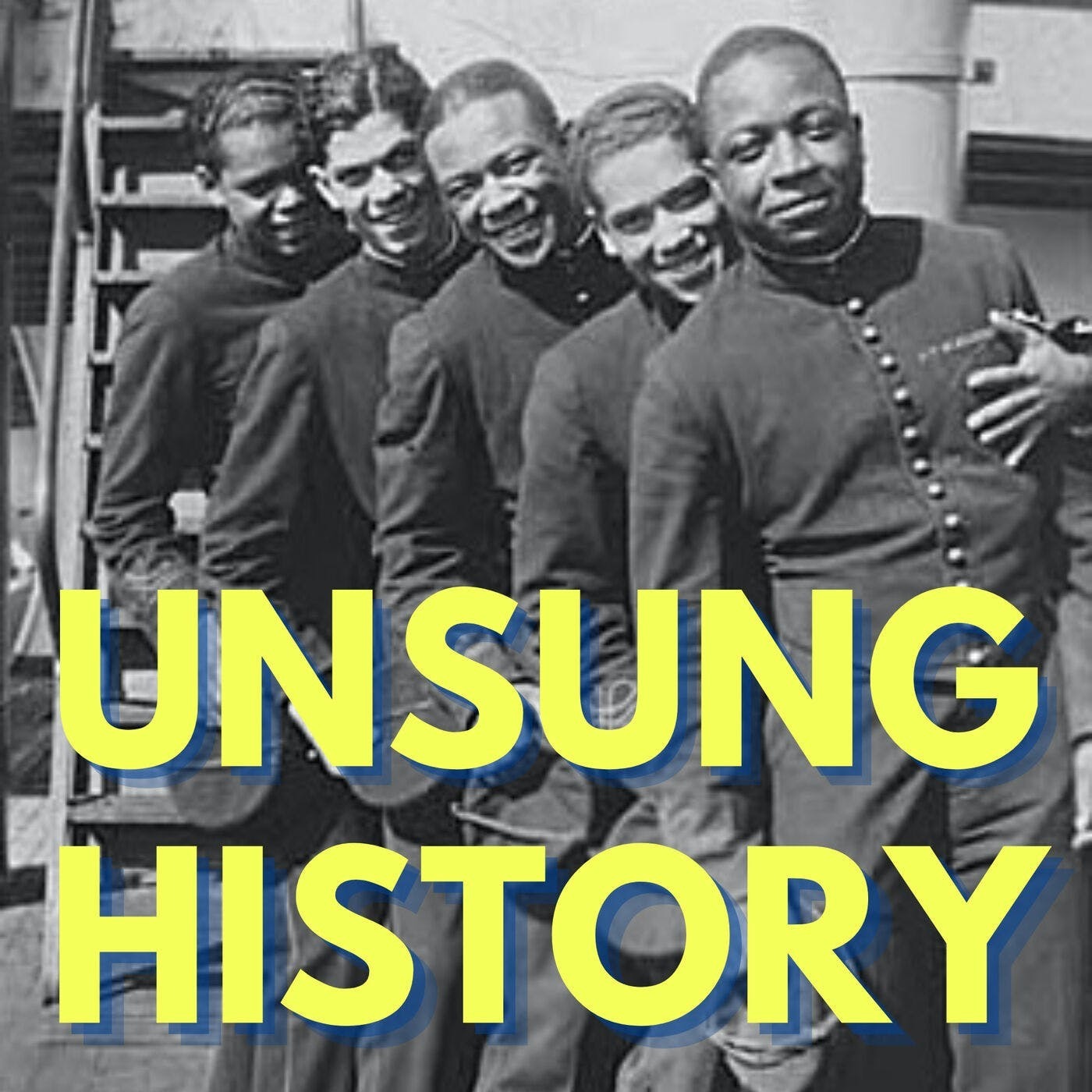
Unsung HistoryHomosexuality and the Left Before 1960Political activism of queer people in the United States started long before the Stonewall riots in 1969. One surprising place that queer people found a home for their activism was in the Communist Party. The Communist Party of the United States was established in 1919, and from the 1920s to the 1940s the Party was influential in American politics, at the forefront of labor organizing and opposition to racism. It was the first political party in the US to be racially integrated. Some queer folks embraced the radical politics of the Party and found it to be a place where they...
2021-07-0536 min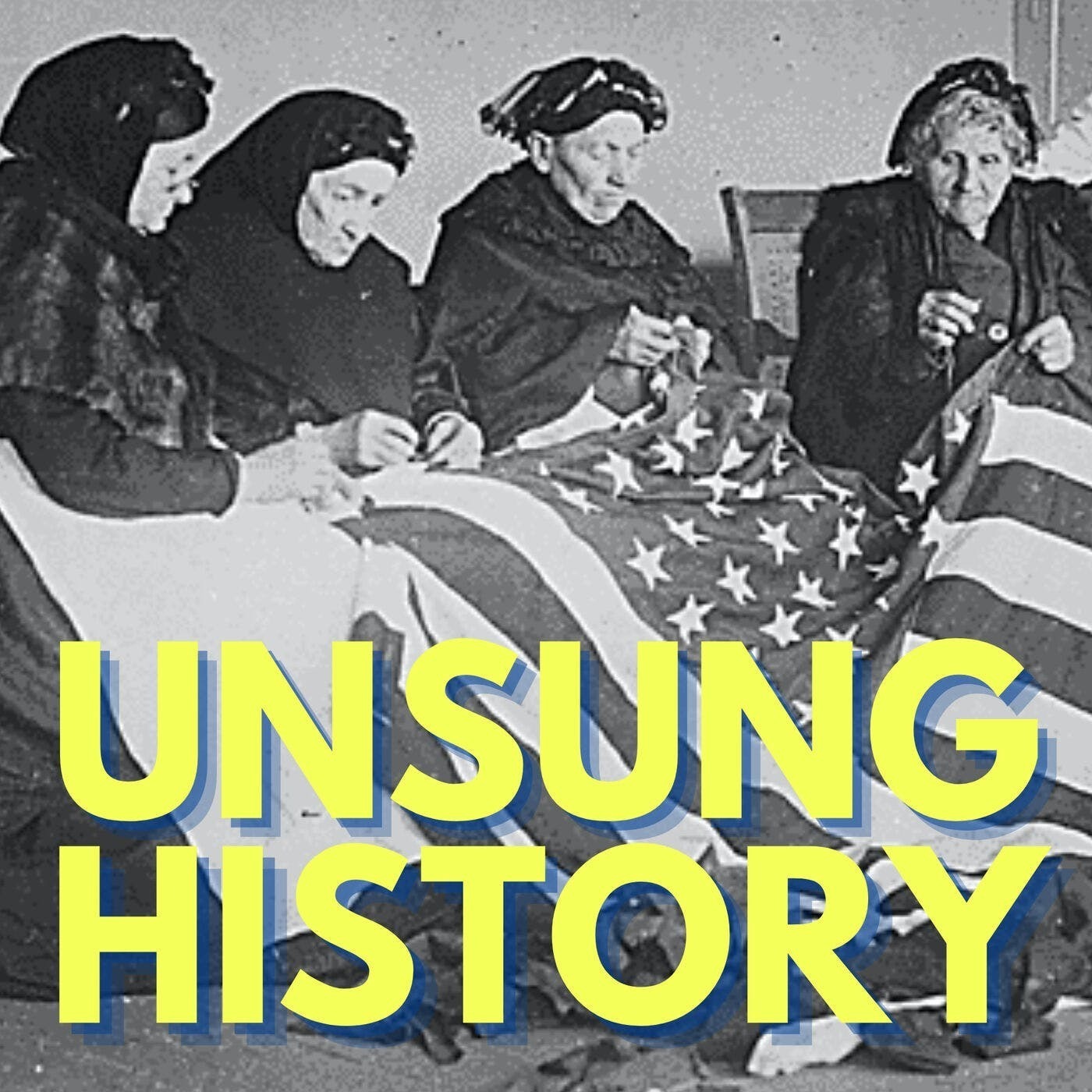
Unsung HistorySophonisba BreckinridgeSophonisba “Nisba” Preston Breckinridge, born April 1, 1866, was a woman of firsts. Breckinridge was the first woman admitted to the Kentucky bar to practice law in 1895; the first woman to earn a PhD in Political Science at the University of Chicago in 1901; the first woman to earn a JD at the University of Chicago Law School in 1904; the first woman professor granted a named professorship at the University of Chicago in 1929; and the first woman to serve as U.S. representative to a high-level international conference in 1933.Along the way, Breckinridge co-founded the University of Chic...
2021-06-2841 min
Unsung HistorySusie King Taylorusie King Taylor was born into slavery in Georgia in 1848. With the help of family members, she was educated and escaped, joining the Union army at the age of 14, to serve ostensibly as a laundress, but in reality as a nurse, teacher, and even musket preparer. In 1902, Taylor published Reminiscences of My Life in Camp with the 33d United States Colored Troops, an autobiography that covers not just her experiences during the Civil War, but also her childhood and her later years. Taylor includes in the work her powerful analysis of race relations at the beginning of 20th Century.
2021-06-2130 min
Unsung HistoryThe Jackson State Shootings in May 1970Just after midnight on May 15, 1970, officers opened fire on a group of unarmed students milling in front of a dorm on the campus of Jackson State College in Jackson, Mississippi, killing two and wounding twelve. Although the shootings took place just a week and a half after the shootings at Kent State University, the Jackson State shootings never got the attention of those at Kent State, and when they did they were often described as a second Kent State, erasing the context of white supremacy and state-based violence that inform what happened in Jackson. K...
2021-06-1433 min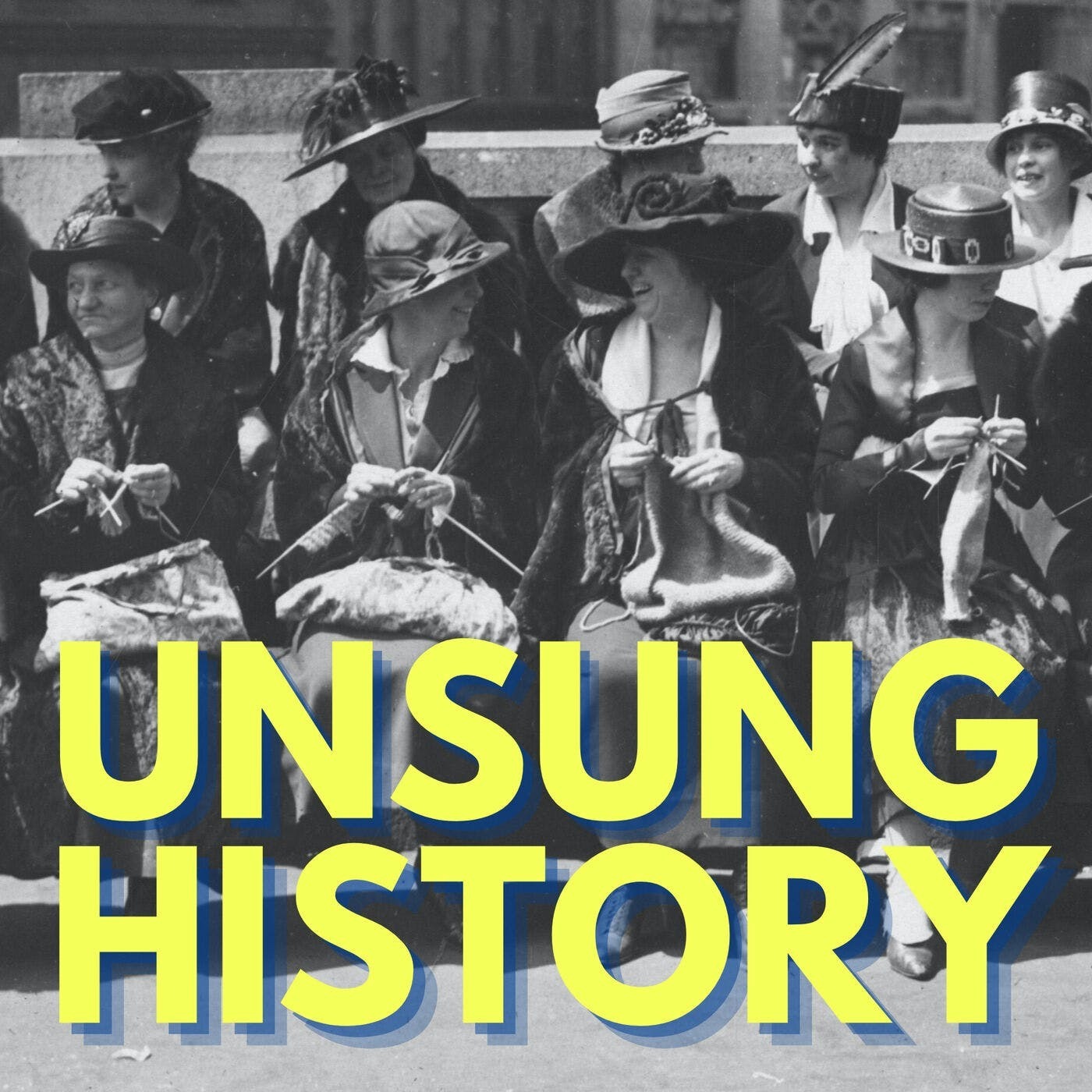
Unsung HistoryKnitting Brigades of World War IBetween America’s entry into World War I and the end of the war less than two years later, Americans knit 23 million articles of clothing and bandages for soldiers overseas, directed by the American Red Cross. How was this knitting organized? Who did the knitting? And why don’t more people know about this impressive feat? Kelly digs into the story of World War I knitting efforts and interviews Holly Korda, author of The Knitting Brigades of World War I: Volunteers for Victory in America and Abroad to find out more.Our theme song is Frogs Legs Rag, co...
2021-06-0734 min
Unsung HistoryIntroducing Unsung HistoryA podcast about the people and events in American history you may not know much about. Yet. With host Kelly Therese Pollock.In each episode of Unsung History I’ll start us out with a short narrative answering the Who, What, When, and Where to introduce you to the topic, and then I’ll talk to someone who can help us learn the Why and How: a historian or other academic, a journalist or researcher, or someone who was there when history as history unfolded. Launching June 7, 2021.Advertising Inquiries: https://redcircle.com/brands
2021-06-0302 min
SportsDazThe Fair Green (Camogie - Therese Maher) - Tuesday, 27th October 2020This week's guest on 'The Fair Green' is Galway camogie legend Therese Maher.
Her 17-year quest for All-Ireland championship glory was documented both domestically and nationally but she did receive her deserved happy ending in 2013 when the Tribesmen finally won back the O'Duffy Cup.
All-Ireland success at club level eluded her despite appearing in three finals. But with five All-Stars, four county titles, player of the year awards, minor, Gael Linn, Kilmacud 7s and leagues, Maher's CV is rivalled by few of her peers.
She chats to SportsDaz about her career, Blue Peter a...
2020-10-2741 min
Let’s Talk ShopLet's Talk Shop with Kelly Jennings from Bookish and BakewellThis episode I chat with Kelly Jennings, owner of Bookish and Bakewell, a gift company who make great gifts for all the book lovers out there. I loved chatting with Kelly, there were lots of laughs and I had so much fun. Kelly started wholesaling her range of pins, stickers and more last year and we chatted about:
- Building a business and the flexibility it gives you and the challenges it comes with.
- How shop owners and brand owners are very similar, both are often one person businesses trying to do everything.
2019-07-1559 min